Feed aggregator
Race to the Rides
More interesting news from Cartoon Brew: “Viva Pictures has picked up North American rights to the animated feature Grand Prix of Europe. The story of the film revolves around Edda, a racing car-obsessed young mouse, who must disguise herself as her idol, Ed, and take his place to compete in the Grand Prix to save her family’s amusement park. The film is a tie-in for the German theme park Europa-Park, which celebrates its 50th anniversary next year. The theme park has won the Golden Ticket Award eight times for being the best park worldwide.” Viva Pictures is also making quite a name for itself for distributing more obscure animated feature films. After finding success with The Amazing Maurice, they went on to bring us Dragonkeeper and the upcoming 200% Wolf.
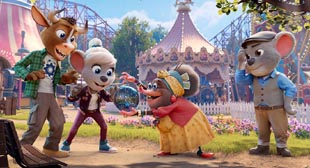
image c. 2024 Viva Pictures
Issue 21

Welcome to Issue 21 of Zooscape!
The world turned upside down, and everyone went scrambling, trying to hold on to the past or find a new way of existing in the turmoil. The world does that sometimes. It turns upside down, and you find yourself lost in a swamp of confusion.
One of the most surefire ways of turning your own world upside down is to have children. They’ll turn your world upside down over and over again.
I started Zooscape when my younger child started kindergarten, and I suddenly had a lot more free time on my hands. I put Zooscape submissions on a long-term, indefinite-length hiatus when I discovered my older child needed more help getting through high school than I’d expected.
My world turned upside down, and the rest of the world got Zooscape. My world turned upside down again, and the rest of the world had to wait to see if Zooscape would come back again or not. Meanwhile, I made sure to store a bunch of stories up to keep you all entertained while you wait…
* * *
Frog Song by Koji A. Dae
Don’t Cry by Ian Madison Keller
The Frog Wife by Rebecca E. Treasure
The Cloak by Erin Brown
How Fred the Opossum Mobilized the Microbes and Saved the Universe by Mary Jo Rabe
If Your Child’s a Dragon by Chad Gayle
* * *
…and now that everyone has waited so patiently, we’re happy to announce that Zooscape will be re-opening to submissions on January 1st, 2025.(Note: These plans may have changed. Sorry for the inconvenience.)
As always, if you want to support Zooscape, check out our Patreon. Also, you can pick up e-book or paperback volumes of our first 13 issues bundled into four anthologies, complete with an illustration for every story.
If Your Child’s a Dragon
by Chad Gayle
 “…it isn’t easy dealing with the problems of a troubled young dragon, as you already know. I’m here to tell you that you don’t have to do it alone.”
“…it isn’t easy dealing with the problems of a troubled young dragon, as you already know. I’m here to tell you that you don’t have to do it alone.”
If your child’s a dragon, there’s no need to explain your tattered clothes or the smoke rings round your eyes. We know how your eyebrows got singed, and we know you spent half an hour or more circling the parking lot because you really didn’t want to walk through those double doors. You didn’t want to take your place among us, to admit by your very presence that you’re afraid of your young dragon, nor do you want to acknowledge that the love you’ve always felt for the magical creature living in your midst is fraught, these days, with dread and disappointment. Most of all, you’d rather not divulge the secret that you’ve kept hidden from family members, friends, and coworkers for so long, the awful truth about the life you’ve been living, the fact that there have been moments, far too many now for you to count, when you’ve wanted to kick your dragon to the curb, to send them packing and to do your best, afterwards, to forget you ever loved them at all.
We know all about these feelings because our children are dragons too. We’ve felt your shame, your self-deprecating guilt, and your nauseating fear. Like you, we’ve all been burned so badly by our dragons that we thought our wounds would never heal.
And we all have our stories; mine’s probably not that much different from yours. Along with my partner, I pampered my dragon with love and affection, and together we tried to make sure she felt wanted, safe, and secure. As our dragon grew older, we told her how important it was to talk about her feelings, to learn to understand not only why she was happy but why she might be sad, and we did the best we could to help her figure out the place she wanted to occupy in this world. We tried to be there for our dragon; we did everything we thought we were supposed to do, which, as it turned out, was not enough.
What we didn’t see, or what we weren’t prepared to acknowledge, I should say, was the magnitude of the anxiety that beset our dragon as she matured. The first real sign of trouble came when we realized that our dragon had stopped attending flight school, which, as you are no doubt aware, puts a dragon at risk of becoming permanently dependent upon humans. At about the same time that we made this discovery, our dragon started smoking, and she smoked incessantly, filling our house with sulfurous fumes that kept me and my partner coughing for hours on end. Maybe you’re a member of the camp that believes dragons can quit smoking after they start. I happen to think that they can’t because I’ve spent the last two years administering anti-smoking punishments and potions and poultices to our dragon that never gave us more than a few weeks’ worth of clean air. But that’s my dragon — maybe yours is different.
Anyway, the smoking was the least of our worries. As her anxiety intensified, our dragon tore up the furniture and picked at her scales with her claws until her body was covered with sores. And she became bolder and more aggressive with me and my partner, thumping her tail menacingly against the walls or the floor as soon as we brought up her mounting absences from flight school.
Sure, it’s adorable when your dragon’s knee high and she whips your ankle with that little tail of hers, but it’s not quite the same when her head reaches the ceiling and a mere flick of that tail — which is as thick as a tree trunk — can break your femur or every one of your ribs. I don’t know if you’ve reached the point in your relationship with your young dragon where lines have been crossed and bones have been bent, but I’m sure you’ve had glimmers of how much worse it can get in the darkest of your dreams, nightmares in which you grapple with the questions I grappled with after I came home from the hospital that first time. Questions like, what if she hurts me again? What if she hurts someone else? I know these bones will mend, but how can the damage done to my heart ever be repaired?
I would love to say we worked out all of our problems on our own, that our dragon quit smoking, returned to flight school, and took a solemn oath never to strike me or my partner again, but the time for myth-making is over, my friends. As awful as it makes us feel, my partner and I had to admit that our dragon is better off living somewhere else for the time being, sheltered in a closed preserve with dragons her age where she can be monitored and privately tutored, and so we are in the process of finding a program where she can get the care that she needs without endangering herself — or us — any longer. Which isn’t to say that I still don’t find myself grasping at straws, searching desperately for reasons to keep her with us for at least a few more months, but I’ve accepted the recommendations of the wizard we consulted, and I’m committed to following through with this treatment plan because I know that we have to think not only of the health and safety of our dragon but of our own health and safety as well.
I’m sure you’re asking yourself, as you try to get comfortable in your seat, how any of this helps you, in your situation, which is different in various degrees from mine. The answer is that although our situations may be different, the problems that we face with our dragons are very much the same. That’s why we all meet here in this great cathedral every other Monday night — to tell our dragon stories and to lean on each other during times of crisis and conflict. Because it isn’t easy dealing with the problems of a troubled young dragon, as you already know. I’m here to tell you that you don’t have to do it alone.
We don’t pretend to have all the answers, but we do try to support each other however we can. We come to this sacred place from townships all over this kingdom because we refuse to give up on our young dragons, because we believe in the possibility of a better future for all dragons, everywhere. We’re dragon people, in other words, and we’re proud of it.
Well, as usual, I’ve stood behind this podium a lot longer than I’m supposed to, but that’s because I’m so happy to see all of these new faces here today. Now I want to welcome you all and tell you how much I look forward to hearing your dragon tales and to walking the road to recovery with you. We really like to think of ourselves as one big family, you know — but, be that as it may, I’m getting that hand signal from my partner again; yep, I can put a sock in it and yield the floor.
One very, very last thing before I open it up to the new parents and give you all a break by sitting down: if your child is a gnome, my apologies — you want the green room at the end of the hall.
* * *

About the Author
Chad Gayle is a writer and photographer based in NYC. His speculative fiction has appeared in The Colored Lens and MetaStellar Magazine; his commercial photography has been featured in The New York Times and The Huffington Post. Husband to the world’s most talented veterinarian, he has witnessed countless stories of furry recovery and redemption that have given him a reason to believe in a brighter future and a better tomorrow for animals everywhere (humans included). He is also the proud parent of two amazing children and three rescue cats.
How Fred the Opossum Mobilized the Microbes and Saved the Universe
by Mary Jo Rabe
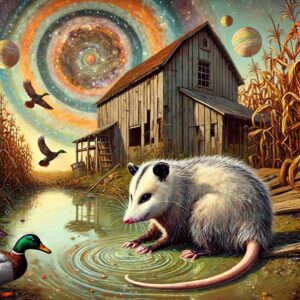 “Fred deliberately thought of nothing as he concentrated on soaking up impressions from the microbes in the pond.”
“Fred deliberately thought of nothing as he concentrated on soaking up impressions from the microbes in the pond.”
It turned out to be a perfect time for saving the universe. Fortunately, Fred the resident farm opossum was paying attention, as always.
After a long nap, some careful foraging activity, and resultant nibbling, Fred the opossum laid his moderately chubby body down on the brown grass and dipped the sticky claws on his front feet tentatively into the muddy duck pond.
The ducks flew off, quacking loudly in protest but acknowledging the potential danger of Fred’s presence. Completely unnecessary. Fred would never bother trying to kill a duck. Too much effort involved. Duck cadavers, marinated in the pond for a couple of days and covered with a crust of crunchy maggots, on the other hand, were a savory delicacy. He was more than content to let someone else take care of actually slaying the avian creatures.
To his relief, the pond water was more than satisfactory for his purposes today, both in temperature and in general viscosity. The air around Fred was cool and dry, which was pleasant since he was sensitive to temperatures for a few hours after waking up. Cool was better than hot.
Fred preferred cold water to remove the insect remains from his claws. His limbs were still quite agile for his advanced age, but it was to his advantage to keep his grasping appendages free of obstruction.
Mud was also quite useful as a soothing lotion for sore paws. An opossum that tended to his body parts tended to live longer, which was Fred’s constant goal.
It smelled like the hogs hadn’t been near the pond for a while. Fred’s pink nose on his long, thin snout couldn’t detect even a whiff of hog excrement, just overly ripened corn from the fields, a promising scent. There would be plenty of tasty, sated insects in the cornfields for dessert later.
The dark, deep pond — frequented by the farm animals but ignored by the human creatures — was hidden behind the three-story wooden barn, itself shabby with weathered planks that had been painted red in more prosperous times, now missing the occasional slab. The current humans weren’t concerned with appearances.
Fred found the structure imposing, if only in size. These human creatures were generally clueless about important things, but they did construct impressive objects for habitation, both for themselves and for their animals.
The increasing chill in the air meant that it was probably getting close to sundown. The sunlight was getting dimmer, which annoyed Fred somewhat.
There were no clouds, and he hoped that it wouldn’t rain. It wasn’t that he disliked rain. His thick, gray fur protected him from hypothermia, and he quite enjoyed shaking and shimmying to get the heavy raindrops off his bristly hairs.
However, Fred missed the light that clouds restricted. It was bad enough that the light receded every day, even though that made life safer for opossums. In the few hours Fred was awake during the day, he loved to watch the joyous play of sunbeams on plants and ponds, making their colors dance, a pleasure possibly unique to this planet.
Fred might be elderly, but he was certain that his body and mind were in excellent shape, if only because he kept both active.
There was still time before supper, and so Fred decided to slip into the pond for a quick, relaxing swim. He liked to feel supported by the water while he paddled around and opened his mind to discussions with the microbes who lived in the pond, probably his best friends on the farm.
As the ticks in his fur fell off and floated away, Fred swallowed each one with gusto. Crunchy ticks soaked in fragrant pond water made for a delightful appetizer.
Fred deliberately thought of nothing as he concentrated on soaking up impressions from the microbes in the pond. In structure, they were simpler creatures who, however, when united, far outmatched more complex creatures in powers of observation and analysis. He could only hope that he didn’t bore them with his thoughts.
The communication chain worked best top to bottom. More complicated creatures could send messages down to creatures with less complicated structures fairly easily. The less complicated creatures had no trouble taking these messages apart and analyzing them.
However, it demanded strenuous concentration for a creature with a more complicated structure to understand what the less complicated creatures were communicating. Their messages came slowly and were often interrupted. Fred had the patience and physical vigor necessary for listening. Plus, he enjoyed hearing from the microbes.
Most opossums ridiculed him for talking to the microbes. Fred got tired of explaining that he listened far more than he talked and that opossums were foolish to ignore sources of information.
Other opossums were just as receptive as Fred by nature, but they preferred to spend their time eating, mating, and sleeping.
Today, floating in the pond, Fred engaged in pleasant chitchat with the microbes, nothing serious, just comments on life in general. While listening to them, he thought he sensed something else, something not quite right in the universe, but nothing he could put his paw on. The microbes themselves had no worries they wanted to pass on.
After splashing around for many enjoyable minutes, Fred decided it was time to think about setting his refreshed legs in motion and joining the semi-feral farm cats for supper.
The felines did consume the occasional small rodent on the farm but also let themselves be fed outside the farmhouse by the somewhat capricious though kindly human creatures.
Fred and the cats got along well enough. It was only when a new cat arrived that Fred had to re-establish the pecking order ─ or, in this case, the order of growling, pawing, and slapping ─ for the feral but currently resident mammals on this farm.
Cats had to be reminded that opossums ruled. He had managed to acquire their respect one by one as they showed up at the farm.
For some reason feline tourism abounded in this area. Fickle cats always thought they might get better food at a different farm.
They were wrong. The occupants of this dilapidated farmhouse were quite skillful cooks. The repast they set out for visiting animals was always delicious; it just tended to arrive at varying times. Fred had long since learned to be flexible in his eating habits.
However, it was common knowledge, or perhaps inherited memories, that opossums shouldn’t go near humans, if only to avoid becoming a premature component of the food chain. Some humans were known to consume opossums, calling them tasty vittles.
The humans in this house didn’t use that kind of language, but a cautious opossum took nothing for granted.
Caution had its benefits, one of which was avoiding the necessity of “playing possum.” It was beneath Fred’s dignity to lie immobile, roll his eyes, draw back his lips, bare his teeth, and expel noxiously fumed secretions from his anal glands. It took far too many swims in the duck pond to rid himself of that stench afterwards.
Fred developed the habit of waiting for darkness before he approached the farmhouse to partake of the banquet the humans would offer. He always only ate after the humans returned inside.
It was getting darker, and so Fred swam toward the edge of the pond. Out of habit, he perked up his dark, rounded ears, not to listen to the motors of the tractors, combines, and harvesters on the farm, but to be open for any important information.
Opossums had a special talent for hearing, for listening to the grunts and lowing of farm animals, of course, but also for absorbing messages from other more complicated structures in the universe.
Most such data was boring, but every now and then Fred picked up on something useful. Way back when, his ancient ancestors had detected the behavior of an approaching asteroid and made arrangements to survive underground.
Unfortunately, it wasn’t possible to warn the dinosaurs. They just didn’t listen to the pleas of primitive, tiny mammals. This was still the case today. Opossums couldn’t communicate with more complexly structured creatures because such creatures couldn’t concentrate on what the opossums said.
Right now, Fred could only be certain that he sensed powerful, individual thoughts from the six-legged creatures he intended to devour later. Flies, mosquitoes, and gnats, buzzing and humming contentedly, were busy selecting their own sources of nourishment in the cornfields.
Fred stomped out of the pond and shook the water off his fur. Feeling energetic again, he scampered around the barn and down the hill to the two-story, old-fashioned farmhouse, probably painted white some time ago but now displaying graying boards.
His timing, as always, was perfect. The screen door opened and a tall, female human, followed by her loquacious, diminutive offspring, brought out bowls of meat and milk and water. Today, as so often, the child seemed to understand the greetings Fred sent him.
When the adult headed back into the house, Fred jumped up the steps to the porch where the door to the kitchen was. Fred growled and then shoved his way through the crowd of cats, who submissively moved aside and made a path for him.
“Fred’s here,” the child shouted. Since the creature wasn’t even half the size of his parent, and since Fred only received benevolent telepathic thoughts from him, Fred wasn’t afraid of him, though Fred did feel more secure when the all the humans went back into the house.
Fred, of course, did have a distinguished opossum name, but after the child had started yelling “Fred” at him in such a delighted tone of voice a few years ago, Fred decided to claim it for himself. The name “Fred” brought about pleasant associations with the evening meal the humans provided.
However, survival instincts demanded that Fred wolf down the food and drink and then head for the cornfields before the humans could suddenly pose any threat. While his behavior might be considered rude, he consoled himself with the thought that the humans could always talk to the feral cats if they needed mindless repartee with their outdoor dinner guests.
Fred scurried over to the nearest cornfield, running until he was convinced that he was invisible to the humans. As expected, he found sufficient insects for his dessert crawling around between the muddy rows.
When he couldn’t eat any more of the tasty, crisp insects, Fred lay down between a few stalks of corn and looked up at the sky. This was the time of day when he was most awake.
Without the food the humans provided, he would have to be off hunting. However, with a temporarily full stomach, Fred could tend to what he liked best. As soon as the humans extinguished the toys in their house that lit it up, the cloudless sky gave Fred an excellent view of outer space.
He ceased all conscious thought, opened his mind to any impressions he might absorb, and concentrated on the stars.
Fred always loved those points of light, the hints of color in the black night. Fortunately, the air was dry and cloudless. He had a completely unobstructed view, which should have made him unreservedly happy, but he sensed something was wrong.
It took a while before he could comprehend the messages. He directed his full concentration upwards. The stars didn’t radiate their usual joyful contentment. A sense of apprehension pervaded, which was unusual for the stars and galaxies that generally moved with the abandon that the laws of physics allowed.
Although it was his habit to spend about an hour in the cornfields enjoying his dessert, this time Fred spent the entire night watching and listening. It took that long to make sense out of the feelings he was absorbing, to translate feelings into concrete thoughts.
There were just so many stars to listen to. Eventually he understood that they were all broadcasting the same message, however with varying details.
The universe was in danger because one of the infinite numbers of parallel universes was on its way to collide with this one. Since the parallel universe was larger, after the collision, the parallel universe would dominate the resulting, newly formed, compound universe.
The physical laws of the parallel universe were such that matter would be unable to form, and existing matter would quickly degenerate to pure radiation.
This prospect made the stars sad, which Fred the opossum could understand. Being an opossum on this farm on this planet occasionally had some disadvantages, but he had no desire to be turned into an unstable collection of meandering photons.
More to the point, however, how could this collision be prevented?
Fred knew when he needed to brainstorm. Whenever he was at a complete loss, he consulted the microbes in the duck pond. They always listened to him. Each individual microbe didn’t know much, but when they joined to a telepathic group mind, they often came up with excellent ideas.
Fred shuffled out of the muddy cornfield and, as soon as he was on firm ground, scurried over to the duck pond and dived in.
“Yo, microbes,” Fred began his telepathic message. “Listen up. We all have a problem.”
“One of the new cats steal your food again?” the microbe group mind asked.
“No, no,” Fred said patiently. “This is a real problem, unless you like the thought of losing your physical existence and being turned into pure energy.”
That got their attention. Fred explained that some stars at the outer edge of where dark energy pushed them had noticed disturbing changes.
Comparing observations, the shrewd quark stars came to the unanimous conclusion that a parallel brane of a universe was approaching the brane of this one. Collision was probable. The approaching universe was larger and would absorb this one, converting all matter here to radiation.
Fred sensed the uneasiness and uncertainty that this caused among the microbes.
“Any ideas on how we can prevent this?” Fred asked.
“Obviously this is more than microbes can manage,” the microbe group mind answered. “Tell your humans to build something or do something. They’re good at that kind of thing.”
“You know that they don’t have the patience to listen to me,” Fred said. “On their own, they won’t notice anything until it is too late. Then their building skills won’t help them.”
“Still, microbes don’t move universes,” the microbes said. “Maybe we should just go with the flow. Eventually this universe will peter out into nothing anyway. Why not be part of a radiant road show first?”
“Eventually is a long, long time,” Fred said patiently. “Think about it. You enjoy your one-celled existence, absorbing, expelling, moving about. You sense pleasure from the physical feeling when chemicals or life forms move through your membranes. I can’t imagine anything more boring than floating around in a cloud of nothing.”
“Hmm,” the group mind said. “Maybe you’re right, but we still aren’t capable of doing anything.”
“We have to come up with some idea,” Fred said. “Or else we lose it all. You microbes always have a solution to things. Find one for this problem.”
“We can’t do anything, but we might be able to function as intermediaries,” the microbes said after a long pause. “We’ll pass your news down to the molecules, they can pass it down to the atoms, and they can pass it down to the subatomic particles. We’re all forms of matter and, like you said, all have something to lose.”
“Excellent,” Fred said. “I could probably pass the message down as far as the subatomic particles myself, but I wouldn’t be able to hear their replies or suggestions. Just concentrating enough to listen to you takes a lot out of me.”
“Right,” the microbes said. “Each level of complexity can only easily understand communications from a maximum of one lower level. If we concentrate, we can hear the answers from the molecules, they can hear the answers from the atoms, and so forth. Eventually your message would have to reach dark matter and dark energy.”
“Perfect,” Fred said. “I’m sorry I have to involve you, but no one listens to the stars except me.”
“Don’t get your hopes up, though,” the microbes said. “There is a definite problem that the message could get garbled at every level or that it will turn out that no one can do anything.”
“Try anyway,” Fred said. “I have every confidence in you.” This wasn’t completely true. Fred knew that the microbes’ group mind had a capacity for thinking that was far beyond his. Unfortunately, microbes also had difficulties in staying with one project. They were spontaneous, more than a little flighty, and got bored easily.
He had no idea what to expect from subatomic particles all the way down to dark energy. Even if there was a general willingness to do something, Fred had no idea what could be done.
He could only rely on the microbes to initiate some action.
Actually, the sun was now fairly high in the sky, and Fred needed to find a safe place to nap. To get to the next little wooded area Fred would have to retrace his steps past the farmhouse. This seemed too risky. The child was already playing in the front yard. Fred could run fast, but possibly not fast enough.
There were a few thorn bushes at the back of the ramshackle barn. It would be uncomfortable for Fred to crawl between the barn and the bushes, but the location was unlikely to attract the attention of the human creatures. So, no choice.
“I’ll be back later,” Fred said to the microbes as he crawled out of the pond and walked reluctantly over to the bushes. Once he was between them and the barn, he felt invisible enough to sleep for a few hours.
Listening to the microbes and thinking about the fate of the universe must have tired Fred more than he thought. When he woke up, it was very dark, and he was hungry. He suspected that the cats had already consumed his portion of the supper banquet that the humans put out. He would have to survive on whatever he could forage.
First, though, there were more important things to take care of. He wanted to know what the microbes had accomplished, if anything.
He stumbled over to the duck pond and dived in. When he was physically surrounded by the microbes, it was less strenuous to listen to them.
“Yo, Fred,” the microbes broadcast into his consciousness.
“Yo, microbes,” Fred answered. “Do you have any news?”
“Yes and no,” the microbes answered. “We’ve been passing the news back and forth all day. We got answers and questions and then answers and more questions and then more answers. For the longest time, the only answer was that there was nothing that could be done. We’re completely worn out.”
“Thanks for trying,” Fred said. “I know this was hard work for you, always concentrating on messages from lower levels of structure. No wonder you’re exhausted.”
“We would have given up hours ago,” the microbes admitted. “But we didn’t want to disappoint you. You’re a good friend, Fred.”
“Thanks, but what is the current situation?” Fred asked.
“The short version is that it’s unanimous through the structures all the way down to dark matter. No one wants to let a parallel universe obliterate this one,” the microbes said. “Dark energy is still undecided.”
“Why?” Fred asked.
“Who knows?” the microbes said. “We’re awfully tired.”
“I know,” Fred said. “If the universe survives, it will be exclusively due to your hard work. The whole universe will owe its existence to you.”
“Yeah, well,” the microbes began. “Only if we succeed, and we are getting too tired to do anything more.”
“I know,” Fred said. “But could you make one more attempt? How about if you send down the thought that dark energy won’t have anything to do in the new universe. A universe consisting solely of radiation doesn’t expand. Any kind of energy would find itself paralyzed.”
“We’ll give it one more try,” the microbes said. Fred heard how fatigued they were. He hoped he wasn’t asking too much. He didn’t want to threaten their existence, especially if the whole attempt turned out to be in vain.
He waited and floated in the pond. He was starving, but it didn’t seem right to abandon the microbes after all they were doing.
“Success,” came the tired reply from the microbes. “Dark energy understood your thought that it had as much to lose as the rest of us. At this moment, it is calculating how it needs to steer the brane this universe is in away from the approaching one. It thinks it is doable. Dark energy just has to pulsate the rate of expansion instead of constantly increasing it. That should yank the universe out of danger.”
“Great,” Fred barked. “You really went to your physical limits and saved us all! How can I make it up to you?”
“To be honest,” the microbe group mind said. “We need reinforcements, additional, energetic microbes to support the group. Can you help us with that?”
Fred’s first thought was to sacrifice a few cats, but he quickly abandoned that suicidal prospect. If he attacked one cat, the others would make cat food out of him.
At that moment, a few ducks landed on the water. Ducks! The proverbial solution of killing two birds with one stone. Fred could attack some ducks and then dunk their cadavers into the pond for the microbes. Once sufficient microbes made their way out of the ducks, Fred could slaughter one duck for his own, long-delayed, evening meal.
Fred was tired as he quietly swam over to the first duck, tired but determined enough to swing a mighty paw and whack his first prey with his claws. It was no problem to then hold the creature under water for a sufficient length of time. The microbes deserved no less for saving the universe. Fred would eat later.
* * *
Originally published in Pulphouse, Issue 18
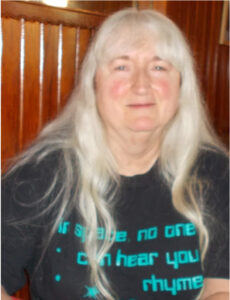 About the Author
About the Author
Mary Jo Rabe grew up on a farm in eastern Iowa, got degrees from Michigan State University (German and math) and University of Wisconsin-Milwaukee (library science). She worked in the library of the chancery office of the Archdiocese of Freiburg, Germany for 41 years, and lives with her husband in Titisee-Neustadt, Germany. She has published “Blue Sunset,” inspired by Spoon River Anthology and The Martian Chronicles, electronically and has had stories published in Fiction River, Pulphouse, Penumbric Speculative Fiction, Alien Dimensions, 4 Star Stories, Fabula Argentea, Crunchy with Chocolate, The Lorelei Signal, The Lost Librarian’s Grave, Draw Down the Moon, Dark Horses, Wyldblood Magazine, and other magazines and anthologies. You can find her blog at: https://maryjorabe.wordpress.com/
The Cloak
by Erin Brown
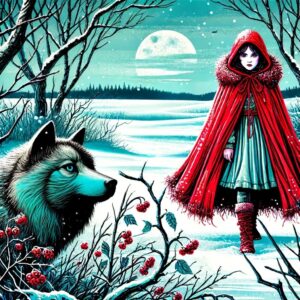 “Her cloak held the warm, soft, stolen remains of all that the wolf had ever loved, all covered by a blood-red cloak and filled with that poison-sweet song, that venomous laughter.”
“Her cloak held the warm, soft, stolen remains of all that the wolf had ever loved, all covered by a blood-red cloak and filled with that poison-sweet song, that venomous laughter.”
The wolf had the brambles to thank for the extra few minutes of life. He had chosen to sleep in the tangle because it had grown a roof of snow, keeping him nearly warm through the winter night, as well as completely hidden. As a result, when the smell of meat and spices and the sweetness of song roused his body in the early morning, the thorns arrested his instinctive pounce before his mind awoke enough to remember caution. Then he recognized the voice.
The song was sweet as any sent to greet a morning’s sunlight, and the smell of the meat twisted his stomach into knots, but the voice made him curl up into a ball of aching bones and frost-tipped fur, and he swallowed a growl. The song grew closer, and then he could see it: the bright red cloak of the hunter girl.
The wolf glared as he watched her approach in her long red coat that dragged across the snowy ground. Behind her, a fist-sized chunk of green and shining bacon was dragged along on the end of a thin rope. It had long ago stopped marking a trail in juices and simply scraped its path across the snow, across her boot prints. She walked slowly, singing all the while, and her crossbow hung by her side, pointed down, carried stiffly. The wolf could barely tell if the ache in his belly was hunger, or hatred. The words of her song silenced the few birds singing above in the bare trees.
Here little wolf, little wolf, little wolfie
Come to me, come to me
The winter is cold, and my gran needs a blanket
So I’ll never let you be.
The wolf restrained himself from snapping his jaws at the brambles, from tearing at the thorns until the way to her was as exposed as a throat. As she walked, a bright red blotch against the whiteness of the world, black scratching the white sky all around by the barren limbs of the trees, her cloak flapped a little, and the thick grey lining showed itself. The tops of her boots were fuzzy and brown. The wolf knew them intimately.
Her boots were lined with the hide of his mother, the scent tainted by the girls own body scent. Her cloak was lined with his brothers, their skins draped across her shoulders, or dragged across the snow. The red hood on her head hid a mottled white fluff that had been the belly of his sister. He did not know whose fangs made up her buttons, but to get close enough to find out was to get close enough to bite, and be bitten.
His mouth filled with bitter saliva, and it drooled down his jaw and froze in his fur. The bacon, as hungry as he was, barely mattered. The girl was stout and strong, and her smell healthy and hot. But her cloak. Her cloak held the warm, soft, stolen remains of all that the wolf had ever loved, all covered by a blood-red cloak and filled with that poison-sweet song, that venomous laughter.
There had been so many winters without his pack, his family. All of the other packs had been chased away. He was so alone. Food would not stop his misery, just prolong it. Only the cloak was home.
With the memory of love of family warming his hide like weak wet winter sunshine, the wolf stifled a whimper of desolation, but not enough to fool a hunter. The girl stopped and spun around, and looked right into the bramble. She crouched down slowly. His brothers’ skins bunched beneath her, against the snow. His mother, his sister, all dead skins curled around her, to keep her warm. It was intolerable. The girl in the cloak laughed to hear him growl, and set her crossbow across her knee. And smiling right into the wolf’s eyes, she sang.
Here little wolf, little wolf, little wolfie
I see you, I see you
The winter’s so long, and I’m cold and I’m lonely
I’m bettin’ you’re lonely, too.
She laughed at him, her mouth wide and pink, her white teeth so small. She tugged the bacon forward and swung the rope so that the meat landed just a bound away from the brambles, and she laughed when she heard him whine. But she misunderstood the source of his misery. When she had tugged the rope, the reddish-brown fur over her arm showed itself, and the smell of it caught the wolf by the throat. It was a familiar hide, it was family, but the wolf could not remember who. He was forgetting family, love, warmth, life. He was forgetting!
The furs called like howls to his heart. The girl kept singing. But the wolf only heard the silent songs of his family, all warm panting snarling playful recollections, loping across his memories of life before this red demon had appeared to them for the first time, so long ago.
There would be no more winters, either for himself or for this horror and her bow and her cloak. This would end. One of them would laugh, would sing the winter hot as blood again. Only one of them.
The girl swung her crossbow up just as the wolf exploded out of the snowy brambles. She had aimed for the bacon, where she thought the wolf was going.
But he was aiming for home.
* * *
About the Author
Erin Brown is a black, neurodivergent author of horror, fabulist, and fantasy short fiction. She has been published in Fantasy Magazine, FIYAH Magazine, The Deadlands, Midnight and Indigo, The Los Suelos CA Interactive Anthology, and 3Elements Literary Revue, with work in the anthology It Was All a Dream: An Anthology of Bad Horror Tropes Done Right. Erin is also the recipient of the Truman Capote Literary Trust Scholarship in Creative Writing for Spring 2022.
The Frog Wife
by Rebecca E. Treasure
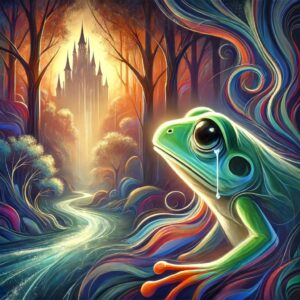 “I suspected he’d make a dreadful human. Something in me needed to know, needed to see.”
“I suspected he’d make a dreadful human. Something in me needed to know, needed to see.”
The bastard left me. Kissed the first pair of pert red lips under a tiara he found. Not a care for our hundreds of children, some of them still without legs, if you can believe it. After all we’ve been through. After all I’d done for him.
The jerk flouncing away with that princess is nothing like the frog I met. Found him moping at the side of the pond, his ribbit a pathetic ribbon of noise barely worthy of the name. When he hopped away from me, that wild look in his eyes, he nearly toppled into the mud sideways. I thought it was endearing — a frog so terrible at frogging.
More fool me.
I took him under my webbed toes, I guess. Showed him how to use his tongue for flies and moths and other things in the dark of the pool. Taught him to jump, leap, splash. The first time we clutched, our croaks filled the cattails and swamp grass with ecstasy.
It wasn’t until we’d been hopping around together for a few seasons that he changed. Just little things. He’d tell me some story or other about his past — before he came to our pond — and then get real quiet. Then he’d be extra nice to me for a few days, going out of his way to tell me how smooth my skin was, how bulging my eyes, how desirable the pinkness of my tongue.
When the tadpoles hatched, he showed such interest I knew something was wrong with him. Even thought the nasty, fish-like things were cute. As they grew legs and came out onto the muck, that most un-froglike pride in the twist of his lips faded to more natural disinterest. But a sadness, too, a sadness I could never explain.
I confronted him, just before winter when we would burrow into mud and shiver-dream away the season of ice and cold before emerging wet and hungry to the spring warmth. I didn’t want to hibernate next to a liar.
He came clean. Well, as clean as a frog can be. A human, he said, cursed by a witch.
Repulsive. Humans captured our children, shook them in jars, cooked their legs and called it a delicacy. Humans were disgusting.
He assured me he could never change, that I was his true love, that being a frog wasn’t as bad as the witch seemed to think. I believed him, that earnest gleam in his shining eyes, and snuggled close.
More fool me.
And then he did change, and he left me one late autumn. Dusk sheltered the pond in a golden glow, the bugs casting long, delicious shadows among the mist. I watched our children hopping among the stands of swamp grass, along the mossy logs, leaping gracefully into the deep-green scum of the silvery water. They were good frogs. They didn’t need me anymore.
He’d been a reasonably good frog — he fertilized my eggs, he seduced me with song once I taught him how. I suspected he’d make a dreadful human. Something in me needed to know, needed to see. What about two legs and endothermia had been worth abandoning everything we had? Abandoning me?
I croaked out a quiet goodbye to our children — only the nearest of them heard — and set off.
It wasn’t an easy journey, though he was simple enough to follow. That bastard had been a frog long enough his footprints dug into the soil as he leapt from step to step. My soft toes blistered after leaving the swampland, my skin cracked and bleeding before dawn spread across the now-rocky road. My croaks grew weak, my eyeballs drying out until I could barely see.
Early afternoon, a castle loomed out of the distance. Even with my fading vision, the spires and balconies caught the sunshine and demanded recognition, attention.
For a moment, I am ashamed to say, I envied them. Imagining the feasts and the comforts, the winters with the heat of a fire washing over me, perhaps in a lukewarm bath instead of the icy mud. But I didn’t cling to the moment, the daydream. What would my ancestors have thought of me, considering giving up the security, the predictability, of our pond for the temporary luxuries of humanity?
I came to a fork in the road. I suppose a human never would have noticed, but my parched vision saw the signs. To the left, in the woods, the call of magic. Lightning and cinnamon, sparking cold fire into the night sky.
The witch.
Why had she picked frogs, of all creatures? I wanted to know, maybe give her a piece of my mind for saddling me with the prince when all it took was one sympathetic pair of lips for him to abandon me. I gave the castle one more derisive glance and leapt into the woods.
I hopped into her hut from beneath the door. Odd, that. The door had such a gap it might have been made to allow small creatures to enter uninvited. Within the hut, there was lovely moisture in the air. My skin cried out, pleasure and pain as I began to moisten. I paused, healing, unsure why I had come.
A wrinkled hand scooped me up. Bulging eyes — unusually attractive for a human — inspected me.
“So. He found a princess after all, did he? I’m sorry he hurt you in the process.” She sighed. “I miscalculated. I thought, as a frog, he couldn’t hurt anyone. I was wrong.”
I resisted the urge to hop in anger, my broken heart thrumming rapidly against her palm.
“Perhaps he learned his lesson about manners?”
I licked my eyeball. All the answer she needed, as she sighed and set me on the worn pine of her workbench.
“So why did you come?” She bustled around, taking up a pewter bowl with tall spindly legs and a great arching handle. She dipped it into a barrel of water in the corner and set it near to, but not quite by, the fire.
My first thought was vengeance. Turn the bastard back into a frog. Turn him to a fly so I could devour him whole. Turn his princess into a fly, and him a frog… the thoughts soured before I gave them voice.
Would I let him drag me so low? He’d given me generations of beautiful children, after all. Joy in the evenings under the dancing stars. Many seasons of pleasure and companionship and pride in the help I’d given him.
The anger flared. True, but in the end he had betrayed me. If not vengeance, then perhaps a lesson — to teach him his place in the world, and the value of others.
The witch was testing the water in the bowl, now, with the back of her hand. She rummaged around on the overcrowded shelves, batting away a buzzing mosquito, and retrieved a smooth sunstone, brilliantly orange. This, she settled in the water.
What lesson could teach him his place if not to be such a perfect creature as a frog? Yet he’d still given all that up, our rich meals, our languorous days, our firefly evenings of clouds and chorus. He would never learn. I snatched the mosquito and, chewing, croaked in conclusion.
More fool he.
The witch, apparently satisfied with her odd creation, turned to me, hands on her waist. “You seem a perfectly capable frog, are you not?”
I croaked, confident, pleased she had noticed.
She shrugged. “Then what do you need the bastard for? Good riddance, I say. I know the princess, you know, and he deserves her.”
She cackled at my cringe. Nobody deserved him, I wanted to say.
“No, you misunderstand. She’ll turn him out. She knows her worth.”
I blinked both sets of eyelids, reassured. She rather had a point. There was little I’d miss, except someone to shiver with in the frozen months.
My worth was no less than a princess, after all.
She gestured at the pot and the stone, near to but not quite by the fire. “I have a bug problem and could use some company in the winter.”
I leapt across the space, catching the sunstone with my tired toes and dipping sore limbs into the perfectly lukewarm water. The stone had caught the warmth of the fire, or had a heat of its own, and soothed my spine.
The bastard may have left me, but it’s not like I was going to miss him. A deep flush of pride for our children pulled a satisfied smack to my lips, but the love was for them. Not him.
With a croak, I settled in for the winter.
* * *
 About the Author
About the Author
Rebecca E. Treasure grew up reading in the Rocky Mountains. After living many places, including the Gulf Coast of Mississippi and Tokyo, she began writing fiction. Rebecca’s short fiction has been published by or is forthcoming from Zooscape, Seize the Press, Galaxy’s Edge, Air & Nothingness Press, The Dread Machine, Flame Tree Publishing, WordFire Press, Galaxy Press, and others. She is the Flash Fiction Editor at Apex Book Company and Magazine, a freelance editor, and a writing mentor for young writers. She currently resides in Stuttgart, Germany, where she juggles children, a corgi, editing, and writing. She only drops the children occasionally.
Don’t Cry
by Ian Madison Keller
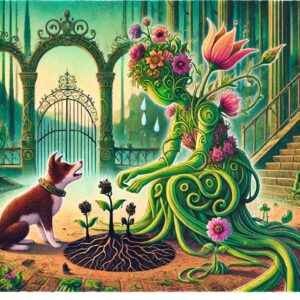 “A healing spell tumbled from her lips by sheer instinct, and she held trembling hands over the head of the closest seedling.”
“A healing spell tumbled from her lips by sheer instinct, and she held trembling hands over the head of the closest seedling.”
With a thought and a wave magic flowed from Queen Seuan’s hand and into the wood of her throne, reshaping it to a more comfortable configuration.
“Continue.”
The supplicant droned on, and she stifled the urge to abandon her royal duties and merge minds with her bonded, Tukura, who was out romping through the ornamental gardens. The blossoms at the end of her vine-hair curled open in pleasure at the thought, but her duties… always her duties first.
The sunlight tasted of autumn harvesting. Her seedling-children, growing tall in her hidden nursery plot, were almost ready to pull up their roots and become sproutlings. At least, all the seeds she’d bothered with. Not all her seeds got planted; cracked or blackened seeds never grew right.
A spark of panic through her bond jolted her out of her reverie, and she mentally left the throne room and linked her thoughts with Tukura.
Tukura sniffed the ground outside in the hedge maze; her hackles raised. <Intruders.>
<My seedlings?> Seuan sat up in alarm, the supplicant forgotten. Not again. She’d inherited her throne right after her first blossoming and was the last of her line, yet every year her garden was poisoned by saboteurs.
She came back to herself and signaled to her adviser to halt the proceedings.
Seuan didn’t wait; she stood and strode away. As soon as she passed through the vine curtain separating the private corridors from the public areas she broke into a run. A guard trotted after her although she ignored him.
<I’m sorry, Seuan.> Grief stabbed her but she couldn’t concentrate enough to see through Tukura’s eyes.
The maze passed in a blur of green and cobblestone paths. Her garden was tucked in a dead-end around a blind corner. A stone archway guarded the entrance. She’d spelled the arch to inform her of intruders, a spell which now hung in tatters.
Tukura crouched on the cobblestone by the tilled dirt, her ears splayed and tail curled around her feet. The double row of her seedlings, which just the night before had been tall and green now drooped to the ground an unhealthy shade of brown.
Seuan slid to stop on her knees in the dirt. Her fine court robes would be ruined and her adviser would scold her, yet she was beyond caring.
A healing spell tumbled from her lips by sheer instinct, and she held trembling hands over the head of the closest seedling. Her palms glowed deep red, the same color as her own blossoms, but the magic pooled with no-where to go. Dead.
She tried again and again, a dozen times, but every time the result was the same.
The sap in her tears stuck to Tukura’s chocolate brown fur. She hadn’t even known she’d started crying or when Tukura had embraced her.
“We’ll try again next spring,” Tukura whispered into her vines.
Seuan trembled. “I don’t have the strength for this.”
“It’s your duty to produce an heir. Succession fights will tear the Empire apart.”
The guard looked around, ears pressed flat. “Your Majesty, you should return to the safety of the palace while we investigate.”
Tukura pulled a sobbing Seuan to her feet and led her towards the archway.
“Momma, no cry,” a high-pitched seedling’s voice said.
Seuan stopped and looked around. Her children remained brown and still in the middle of the square.
“Who dares!” Her tears dried as her anger grew. She might be young, but she was still Queen and would not tolerate tasteless jokes.
“Momma!”
The voice was close. She peered into the green growth on the edges of the garden. Movement caught her eye, and she headed towards it.
The guard’s outstretched paw stopped her. He bounded over and roughly shoved aside the leaves of a broad-leaf thyme revealing the smiling face and shining eyes of a seedling.
Her mind jumped back to planting. She’d had thirteen seeds originally, but one had been black; she’d tossed it away into the bushes and forgotten all about it.
The seedling looked up and wriggled his fingers at her, struggling to move but still rooted. With a determined look he tugged one leg free and then the other, tottering in his new freedom.
Seuan scooped up her newly sprouted child, giving thanks to the Sun God while she cried tears of joy.
* * *
Originally published in Flower Buds.
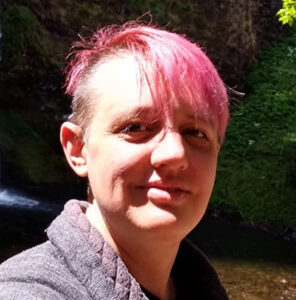 About the Author
About the Author
Ian Madison Keller is a fantasy writer currently living in Oregon. Originally from Utah, he moved up to the Pacific Northwest on a whim a decade ago and never plans on leaving. Ian has been writing since 2013 with nine novels and more than a dozen published short stories out so far. Ian has also written under the name Madison Keller before transitioning in 2019 to Ian. You can find more about him on his website, http://madisonkeller.net
Frog Song
by Koji A. Dae
 “I said it felt like a butterfly, then a hummingbird. But when I was alone, singing to my growing bump, it was a tadpole.”
“I said it felt like a butterfly, then a hummingbird. But when I was alone, singing to my growing bump, it was a tadpole.”
The pains start as little things. Stretching and hardening. Slow and steady and quite manageable. So I pass the morning breathing and walking.
“Like a fly ‘at can’t find a spot to land!” Mama complains and shoos me from the kitchen. I’m surprised she doesn’t take the fly-swatter to my behind.
Honestly, I don’t mind being shooed. Part of me wants my mama, especially as the pains start twisting and pulling, as if something rotten has settled low in my belly. But I’m determined to keep this secret for as long as possible.
Mine.
I put my hand over my abdomen and waddle to the porch.
The first time I felt the baby flip, it was like a tadpole bumping up against reeds. Such a funny, ticklish feeling.
Mama was horrified. “No Becca. Babies are beautiful things. A butterfly flitting from flower to flower. That’s what you feel.”
Ever obedient, I tried to imagine the baby as a winged creature, but the extra weight in my middle definitely felt sloshy. The best I could conjure was a rainbow trout whipping its shiny tail around. I said it felt like a butterfly, then a hummingbird. But when I was alone, singing to my growing bump, it was a tadpole.
So you can’t blame me if I want to keep this as my own for as long as possible. It’s not selfish. Not exactly. It’s just Mama has a way of twisting things, and once she voices her opinion, it has a way of drowning out any other reality that might be fighting to blossom.
Take this house. It’s a fine house, sure, but Granddad was willing to give me and Jackson Uncle Sammy’s old house as a wedding present. It’s a bit drafty but a perfectly good house with two more rooms than this one.
Mama wouldn’t hear of it.
“Too close to those swamps. You’ll never get any sleep for all that croaking.”
She had a point. The north side of Evergreen is a big marsh, which is different than a swamp, but heaven help you if you correct Mama. During mating season, the frog song echoes all the way to the town center, sometimes cutting off the preacher if he goes on too long. But was it enough of a reason to make Papa build an entirely new house on the south edge of town while Uncle Sammy’s sits empty?
The real reason came out after I told her I was pregnant.
“See. Could you imagine having a baby so close to the swamp? It could just toddle off and die.”
She had a real reason with that one. When I was twelve, I nearly drowned in the marsh. Maybe I had gone for a swim, but Mama wasn’t hearing any nonsense about her baby girl swimming in a disgusting swamp, so the official story was I slipped in. Either way, I was underwater so long I almost died. When they pulled me from the marsh, I was covered in algae. Some had gotten in my lungs, the doctor said, and I had a strange infection the hospital couldn’t make sense of. I slept for a week, and when I woke up, I couldn’t remember anything. Not about the pond or my life before it. I also had bad jaundice that yellowed my skin. My blue veins looked green beneath the new coloring, and that green spread all over whenever I blushed. The other kids in town took to calling me frog-girl.
The color never went away, and I never got my memory back. Maybe that’s why I was never afraid of the marsh — I couldn’t remember it doing anything bad to me. If anything, that strange body of water called to me.
But Mama wouldn’t hear of me venturing near it, so I appeased myself by straining to hear the comforting lull of frog song on summer nights until she moved me too far away for even that.
Now, I settle into the rocker Papa made when he learned about the baby. It has a long, smooth motion that soothes me. I close my eyes and listen to the chirping of crickets and the lazy near-silence of summer.
* * *
A pinprick on my left side jolts me from my daze. It’s sharp but manageable at first, but it keeps spreading. Soon everything is tightening. I breathe. Short, short, long, the way the doctor taught me to breathe whenever I had an attack of nerves.
These attacks were so normal to me, I had thought they were common. It wasn’t until I started high school in the nearby city that I realized the sudden wheezing, and muscle weakness was something to be ashamed of.
“Frog girl, frog girl,” the kids would call in the corridors. The nickname had carried over with a few kids from my town. “Watch out, she’s going to croak.”
And I would please them by wheezing in and out — something that definitely sounded of a croak.
When the seizures started, the school recommended Mama “stop the silliness with that country doctor and take me to a specialist.”
The specialist, funny enough, was called Dr. Greene.
* * *
How can something tighten and stretch at the same time? It’s like being ripped in two. I push my feet on the legs of the rocker to stop the motion, lean back, and let out a long, low groan. One that sounds like a croak more than my wheezing ever did.
There’s a clatter in the kitchen that would usually concern me, but it sounds distant beneath my moan, which vibrates my entire body.
Mama’s at my side. I don’t know when she got here, but she’s pushing my hair back and patting my hand and saying comforting words that cool me like sweet tea on a summer day.
Gradually, her words make sense. “That’s it, Becca. Good girl. Almost through it.”
The pain dissipates like sugar, and my whole body relaxes. The chair rocks beneath my sudden weight.
“It’s started.” I can hear the excitement of Mama’s smile. “Why didn’t you come get me?”
I flutter my eyes open. The world is just as still and bright as it was five minutes ago. “I like the rocker.”
She pats my upper arm. “Then you stay here. I’ll go in and get some water to keep you cool. You want anything else?”
I shake my head. It doesn’t matter what I say. Mama’s in charge now, and she’ll come back with whatever she thinks I need. I should be annoyed, but today, it’s a comfort to have someone else in charge. Let her call the doctor and Jackson. I’ll just sit here and become one with all that summer buzzing.
I do wish Jackson was here. He would hold my hand the way he used to outside his father’s office.
Dr. Greene’s office was fancy, with heavy furniture and a dark rug. I remember thinking it was like waiting for my baptism. It had the same old, polished smell as the church. But there was something else. At fifteen, I had felt like a giant among those eight- and nine-year-olds. But Mama had insisted I do it again.
“If you can’t remember your first time, it doesn’t count.”
I wondered if that was true. If so, did none of my life before I was twelve count?
The preacher had given a sermon, but I wasn’t half listening. I had this feeling that I’d be a completely different person after the baptism. The preacher would dunk me, and he’d pull me out changed. I started wheezing and croaking, asking myself if I wanted to change.
I swallowed it down, though, because the actual baptism was held in a pond near the church. When the preacher finished, we walked to the pond singing a low hymn, and one-by-one he dunked us in the water.
Mama wrung her hands the whole time, but her faith was more important than her fear. It was the only time she let me in the water. I nearly slipped on the wet bank, and I heard her sharp intake of breath as I wobbled and steadied myself. I splashed into the water before she could change her mind.
It was cold, and my dress clung to me in some places and floated up in others. The sensation of buoyancy made me grin. The preacher pushed me back, his pressure firmer than I expected, and there was a moment of weightlessness that took away all my fear.
But Dr. Greene’s office was more like the church part. Stiff and stuffy and what if I didn’t want to become the healthy young woman he was supposed to turn me into?
Mama sent me to the bathroom to splash cold water on my face. I calmed down the best I could and was coming out wet and splotchy when I ran into Jackson carrying a box.
I apologized and waited for some harsh comment about my green face, but it never came. I suppose the son of a psychiatrist was raised to be nice to patients, but it didn’t matter why. He was the first boy to be nice to me and, baptism-be-damned, I was determined to fall in love with him.
* * *
I’ve already forgotten the intensity of the last pain. I could almost stand up and go for a walk, but I’m afraid the next one is just around the corner.
There!
No, that was just a twitch. I adjust my position, easing the ache in my lower back.
Mama comes out with a bowl of water, an already wet rag hanging over the side, and a tray of snacks. The baby twists defiantly at the peanut butter and jelly sandwich, but I grab the cup of water and take a deep gulp.
“Easy with that. You don’t want to get a cramp.”
I nod but take another gulp.
“You should eat something.”
Another twitch in my stomach.
“I’m not hungry.”
She sets the tray on a nearby table and pulls the wooden stool next to me. “Doesn’t matter. You’ll need your strength.”
“Did you call Jackson?”
She wrings the cloth out and pats my forehead. “No sense worrying him yet. You’ve got plenty of time.”
I want to ask what makes her such an expert. She’s only had one baby, and that was twenty- three years ago. But still, she’s had one more baby than I have.
Another pain comes. It’s like a wave rushing over me, building and building and refusing to crash, and I’m grateful for Mama’s comforting hand and the cool rag.
Then it’s finally receding like algae parting when a frog jumps off a lily pad into the water.
I give a final groan, and Mama hands me the water. I sip instead of gulping.
“The world seems brighter,” I say.
“Too bright? We could move inside.”
“No. I like it outside.” What I don’t say is I have the strangest urge to go to the marsh.
It’s not the first time the craving has struck me. Other teens would sneak into the city to see a film or go dancing. Me and Jackson snuck off to the Marsh.
It was my idea. Being near that forbidden water excited me as much as his nervous lips on mine. We found a willow tree whose canopy hung out over the water. We leaned against its trunk, and he held me for hours.
“Why do you love it here so much?” he asked me.
“It calms me. The water is so deep and still. It’s relaxing just being near it.” I hugged him, listening to his teenage heart thunder. “And I like sharing it with just you.”
Somewhere in the distance a bullfrog gave a deep belch.
“Well, and him.”
We both laughed, then kissed.
That night Mama noticed the mud on my shoes and the wet seat of my pants. She forbade me from ever seeing Jackson again, but she seemed more concerned with where we had been than with what we were doing.
I suppose she had a reason for that, too. My face swelled up that night. The next morning my eyes were nearly swollen shut and my skin was a deep, leafy green with pustules opening, secreting a light fluid like tears down my cheeks and neck.
Back to the hospital. They said I was allergic to a protein in some human saliva. No kisses for me. No marsh. No frogs. No boyfriend.
* * *
Mama helps me stand and ushers me around our front yard. She assures me that walking will ease the pain and help the baby come faster. But the next contraction brings me to my knees.
I pant hard, and she rubs my back. I go down on all fours and notice every blade of dark green grass. Jackson keeps our yard trimmed, and they’re all cut blunt at the top. If it weren’t for the pain, I’d want to cry. Instead, I cry out. This scream can’t be mistaken for a croak. It’s loud and pure.
“It’ll pass, it’ll pass,” Mama’s saying. And it does.
I collapse back onto my heels, my knees spread in a V to accommodate my low-hanging bump. The sun is too hot on my head, but I’m too wiped out to move back to the porch.
“Tell me about your birth,” I say.
“My birth?”
“I mean mine. Yours with me. What was it like?”
Mama moves my hair from my brow. “There’s not much to tell. You were in my belly, then you were born.”
“Was it day or night? Did it hurt like this?”
She cocks her head to the side and considers, then stands over me. “You don’t want to hear about that. Let me go get some water.”
I’m suddenly back in the pew before the baptism. She’s sitting behind me, whispering. “If you don’t remember, it doesn’t count.”
Looking at all those young kids, I thought, “I’ve never been that young.”
This is what I told Dr. Greene in our first session.
“And do you believe your childhood doesn’t count?” he had asked.
“I just wish my parents talked about it more. Everything they say makes me sound like the perfect daughter. No kid could be that good.”
He chuckled. His eyes were the same shade of blue as Jackson’s, and I thought it would be nice to make him laugh.
Mama comes back and wipes the sweat from my forehead and cheeks. I must be fully green now. Mrs. Becca Greene. Mama used to make me tan for hours in the summer, because brown was more becoming than green. Like she could hide me. Even now, she lowers her eyes instead of looking at my skin.
* * *
When I’m able to stand again, I move down the driveway, away from the house.
“We shouldn’t go too far,” Mama warns.
“I thought you said I have plenty of time,” I huff. Maybe too much irritation comes through my words, because she winces and falls a step behind me.
“Where are we even going?” Her voice is full of false cheer. Beneath it there’s a familiar reverberation. The same waver her tone held when she told me I couldn’t see Jackson or couldn’t go to the Marsh. It’s the same fear she had when she sent me into the city on the bus my first day of school.
By the time my next contraction hits, we’re well down the tree-lined lane, and I know exactly where my feet are taking me. Maybe the idea of the destination gives me a boost of adrenaline, or maybe the contractions ebb and flow naturally. Either way, this one doesn’t bring me to my knees. I brace off of Mama’s shoulders, and squat a little into the buzzing pain in my abdomen.
“Breathe,” she commands.
And, ever obedient, I do.
The pain passes, and I gasp. My gasp turns to laughter. I’m going to make it through this.
“Let’s turn back,” Mama says.
We’re close to the houses at the lower edge of town. People can probably hear my moans. They can see me sweating and squatting.
Mama doesn’t like when people see me as different.
“We’ll have to pull you from school,” Mama had said when I returned from the hospital. “Once this gets out, you’ll never hear the end of it.”
“But Mama, I just have another year!” I whined. “What am I going to do without a diploma?”
“Plenty of women get jobs before they finish their education. You’ll find some place that will accept you for you.”
“I’ll be fine,” I insisted. But she wouldn’t hear of it, and in our house, her word was final.
My only hope at that point was Dr. Greene.
“You’ve got a right to an education,” he explained in our next session. “She can’t keep you home against your will.”
“I can’t go to school knowing she doesn’t want me to,” I said, “She wants what’s best for me, and I can’t hurt her like that.”
He nodded gravely. “And Jackson?”
That’s when I learned that not everyone hated me for being different. Jackson still wanted to date me, even if my allergy meant we couldn’t kiss. At the end of the session, I rushed up to his apartment to find him. We hugged hard, and he held my hand. I felt the overwhelming desire to kiss him, but we just hugged each other tighter.
“You still want me?” I asked.
“My frog-girl? Of course,” he grinned.
It was the first time I didn’t mind turning green. I let a blush run through my full body and relished the heat of it.
That evening, I packed a bag and told Mama I was staying with Jackson and his family. “They’ll take me in until I’m finished with school.”
She grabbed my wrist and spun me around. “You can’t do this to me. I created you.”
I shook her off of me. “If I can’t remember it, it doesn’t count, right?”
Now, I shake her hand off of my arm again. I straighten as best I can and march down the middle of the lazy street. Let the neighbors look.
Mama sighs heavily and scurries after me.
* * *
We’re well past the church, and my contractions are stopping us at least once a block. I’m past the point of leaning on Mama. Every time the tightening starts, I drop to my knees. I end up on the pavement or in the grass, on hands and knees, whining and bellowing like some kind of animal. I grunt and groan and push Mama off when she tries to comfort me. The contractions are coming faster together, but they aren’t as drawn out. It’s an intense minute of squeezing death, then relief. I am quick to pick myself up and keep walking.
When we pass the turnoff to Granddad’s street, Mama realizes where I’m heading.
“No, no, no,” she grabs my elbow. “You can’t be serious, Becca. Not there.”
I want to tell her that I’ve read stories about women in Europe giving birth in pools of water. The baby just slips out of them. It’s supposed to be less traumatic for both baby and mother. But words are beyond me at this point. All I can do is breathe and walk, and hope the baby gives me enough time to reach the marsh. Because somehow, I know that’s where it must be born.
I’m kneeling again, and I look up to her. “Tell me about my birth.”
She shakes her head. “I can’t. That’s what you want me to say, right?”
She wipes frustrated tears from her eyes.
They’re so much like the tears that fell when she finally said, “Fine, you can go to school.”
Those tears weren’t of surrender though. Her allowance was accompanied by a list of rules so long I couldn’t help but feel I was the one who lost. I was to continue living with them. I could see Jackson but only with a chaperone.
She sealed the new deal by kissing my forehead. The site swelled and blistered, reminding me that life was going to be difficult, and I was going to need my Mama to get through it.
“Tell me,” I pant.
She drops to her knees, pretenses-be-damned. “I found you in the swamp when you were twelve years old. We couldn’t find your parents, so we agreed to take you in. The doctor thought it would be easier for you if you just thought we were your parents. You had almost died. You didn’t need to know your parents had abandoned you.”
My head aches. I stand, this time pulling Mama to her feet.
“Let’s go home,” she whimpers.
But I continue walking north.
* * *
“You got everyone in the town to lie about who I am,” I huff after my next contraction.
My defiance sounds the same as it did the day I told Mama I was marrying Jackson.
“You can’t marry that boy,” she had said. “Marriage is about family. How are you ever going to give him babies? You can’t even kiss without swelling up like some… some frog!”
“We’ll figure it out,” I said. By then I had finished school but hadn’t been able to get a job. The potential employers were not as cruel as the school children, but they didn’t want to hire a green-skinned receptionist.
“The doctor thought it was best,” she says again, as if it will excuse half a lifetime of feeling like I didn’t belong and not being able to understand why.
“Did Dr. Greene know?” I bite my lip. Tears blur my vision. “Did Jackson?”
The next contraction tears through me, and my scream goes low and guttural. It sounds too much like a bullfrog. No wonder the children always called me frog-girl. They weren’t wrong. To them I was an oddity from the marsh, not a human playmate they had grown up with.
“Jackson didn’t know.”
At least there’s that.
I get up and continue walking. The blurry edge of the marsh is in view.
* * *
I don’t make it quite to the weeping willow. The contractions start coming too fast and hard, and they take me down by the edge of the water about a hundred yards from the tree. Each one sets my skin on fire and shakes my bones. I weep and cry out and croak.
There’s no one around to hear, which Mama is probably grateful for, but I don’t care. I scream louder. Let them hear my frog song.
There’s a shift in my belly, and a slipping, and I feel the incredible urge to exhale and let the baby drop from me.
“Almost there,” Mama coos. She’s holding my hand and standing behind me, letting me lean against her thighs as I squat deep.
Another tightening and another woosh of exhale. Then a burning between my legs like the preacher’s sermons of hell.
Another.
Then a pop, and it’s over.
A beautiful, grayish-pink baby slips from me. I fall back, Mama lowering me to the wet mud as I reach for my baby and bring her to my chest. She covers my dress with blood and other liquids, and she’s squished up almost too bad to look like a baby, but she’s beautiful.
I cry and hold her to me, and Mama sits in the mud beside us.
“You did good,” she says.
I nod, but I don’t really hear her. Blood still rushes in my ears.
I bend my head to my baby’s. I nuzzle against her, smelling her newborn scent.
“Becca,” Mama says, “Don’t.”
I kiss my newborn’s head.
The pinkish skin turns gray. Then green. It puckers and welts. Her arms flail, then change, webbing growing between her tiny fingers. Her legs fatten. Her head fuses to her tiny body. She stares at me a minute longer, then hops off my stomach.
She’s small for a baby, but large for a frog.
She hops twice, then splashes into the water.
Mama cries. Real tears. Heavy, sobs. Surrender.
I don’t know how I’ll explain this to Jackson, but I do know that if you remember it, it counts.
* * *
About the Author
Koji A. Dae is a queer American writer living long-term in Bulgaria with her husband, two kids, and cat. Her writing focuses on relationships, mental health, generational trauma, and parenting. More of her writing can be found in Clarkesworld, Apex, and her website: kojiadae.ink.
Barkour - Official Reveal Trailer

Just watch the trailer and tell me you don't want this game, we dare you. Barkour is "an action/stealth game where you take on the role of a tail-wagging canine 009 agent, unleashed by a secret organization to fight evil in a world that that's anything but ruff and serious." I mean COME ON!
Creatures of Ava Review

What do you do when you learn about a deadly disease killing a planet? You go rescue all the inhabitants of course! Creatures of Ava start you off landing/crashing on the planet of Ava. It’s up to you and basically you alone, to rescue all the creatures and convince the local intelligent population, the Naam, to leave the dying planet and come live on the space station Bioark.
TigerTails Radio Season 15 Episode 40

TigerTails Radio Season 15 Episode 40. Join the Discord Chat: https://discord.gg/SQ5QuRf For a full preview of events and for previous episodes, please visit http://www.tigertailsradio.co.uk. See website for full breakdown of song credits, which is usually updated shortly after the show. If you like what we do and wish to throw some pennies our way to support us, please consider sending a little tip our way. https://streamlabs.com/tigertailsradio/tip * Please note, tips are made to support TigerTails Radio and are assumed as made with good faith, so are therefore non-refundable. Thank you for your support and understanding.
Star Wars Bounty Hunter (Xbox) Review
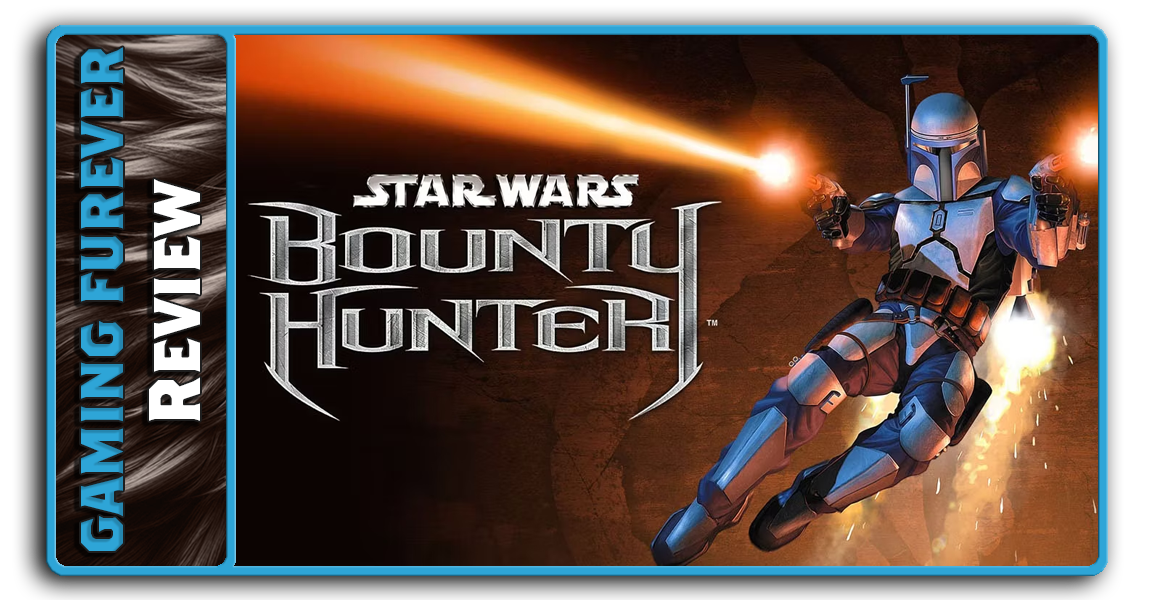
I’m gonna start this review with a hot-take: I don’t think Episode II: Attack Of The Clones is a bad Star Wars movie. In fact, out of all three prequels, it’s actually my favorite of the three films. Yes, some parts do drag but they weren’t enough to soil my enjoyment of the movie. I loved how it expanded on Coruscant in the beginning (Yes, I liked the diner scene and, yes, I’m OK with something like that existing in Star Wars) and the entire Geonosis battle sequence is a visual spectacle of sheer beauty. However, I never played any of the games based on Episode II growing up as they were on systems I didn’t own, like the Gamecube and Xbox as I still had a N64. Thankfully, thanks to the folks over at Aspyr, one of the games I missed out on has got a second chance at life with the remastering of 2002’s ‘Star Wars Bounty Hunter’ and, I gotta say, this game is a mixed bag.
2024 FurMIT台灣金毛影展 在眾人喝采中風光謝幕
2024 FurMIT台灣金毛影展於7/13、14兩日於宜蘭村却國際溫泉酒店進行,除了是首次於宜蘭進行的大型獸聚活動外,同時也是FurMIT團隊所進行最後一屆活動。本次活動共有1804人報名參加,相較上一屆活動參加人數有大幅成長。
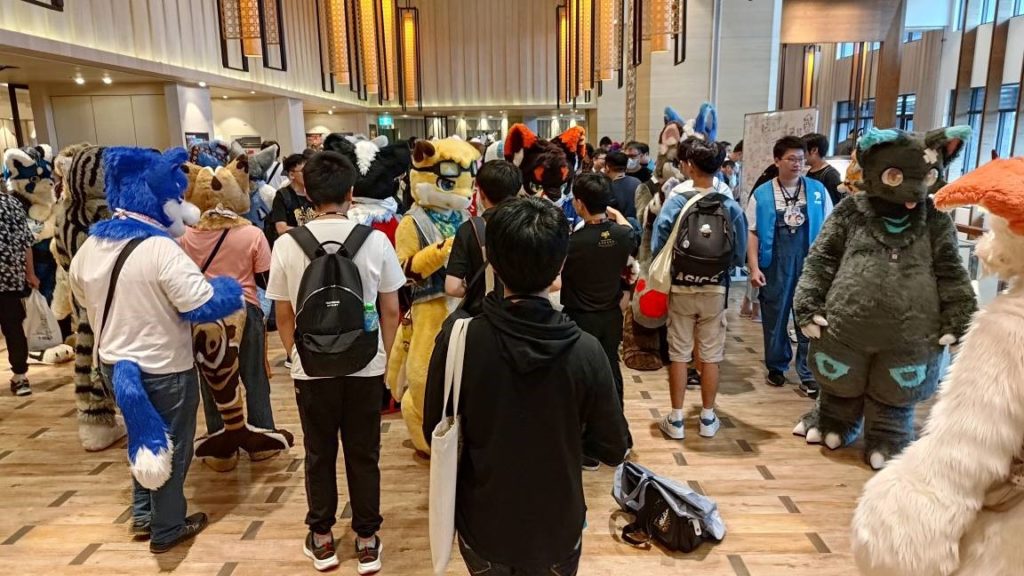 本屆活動參加人數眾多。圖/藍風攝
本屆活動參加人數眾多。圖/藍風攝
本次活動為了讓參加者能有印象深刻的沉浸式體驗,官方在舞台、周邊及活動上皆做出精心設計,讓整場活動宛如影展頒獎典禮,更將主舞台設計成T字舞台讓參加者可以在指定時段能上台進行走秀,感受如同巨星般沉浸於鎂光燈下的體驗。在周六下午也有由官方舉辦的毛毛陽台大合照,讓毛毛們可以在房間陽台被空拍機拍攝,與飯店一同入鏡。
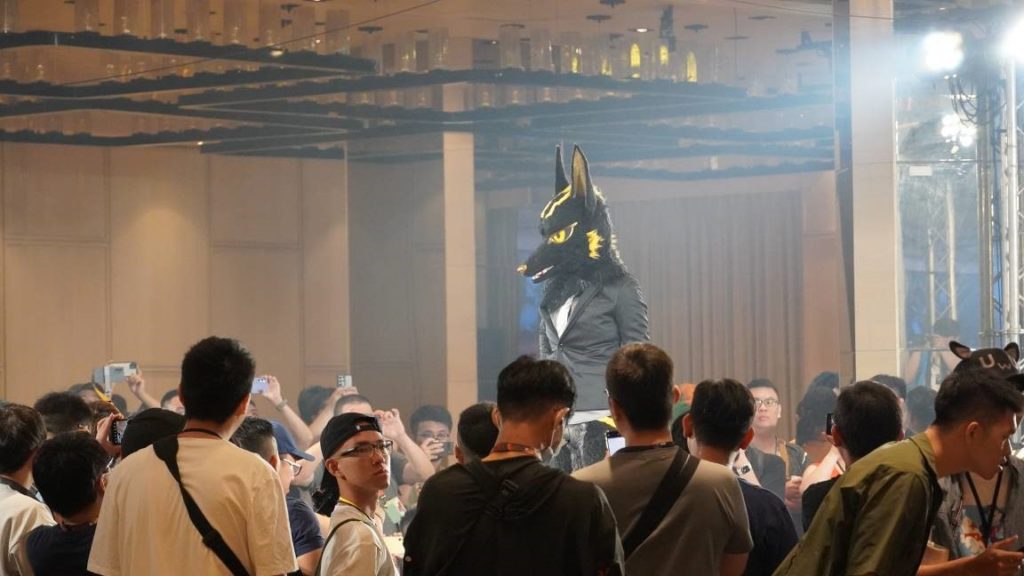 星光紅毯活動,讓毛毛或人類在舞台上走秀展現自我。圖/藍風攝
星光紅毯活動,讓毛毛或人類在舞台上走秀展現自我。圖/藍風攝
官方更邀請日本的プロダクション体育館全員,到活動現場擔任開場表演嘉賓與舞台大對決表演者,與台灣在地舞蹈團隊WANNABEAST在舞台上表演,吸引台下眾人目光。舞台大對決活動也有不少參加者或團隊報名參加,在舞台上盡情表演,展現出自己的才華並發光發熱。
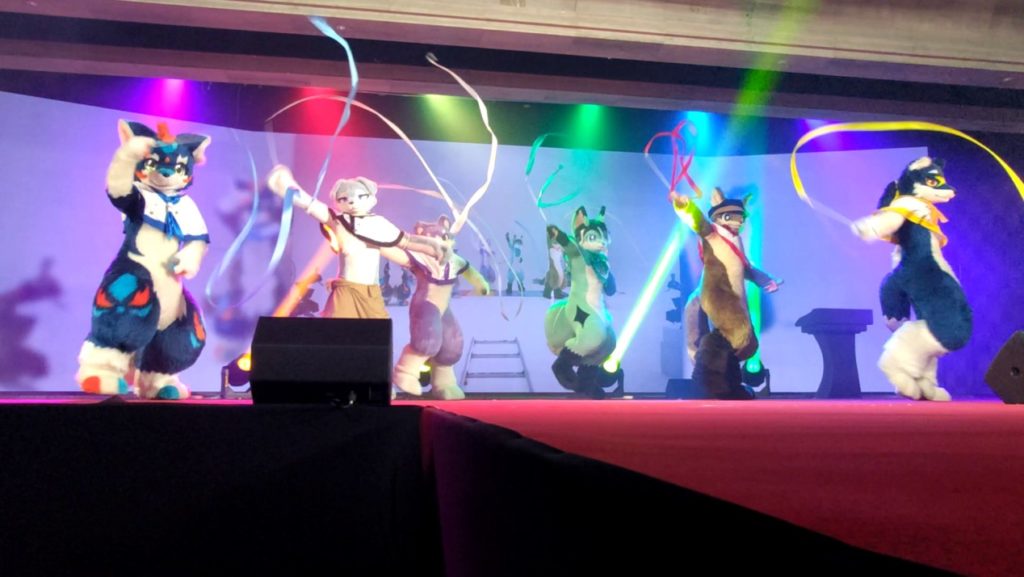
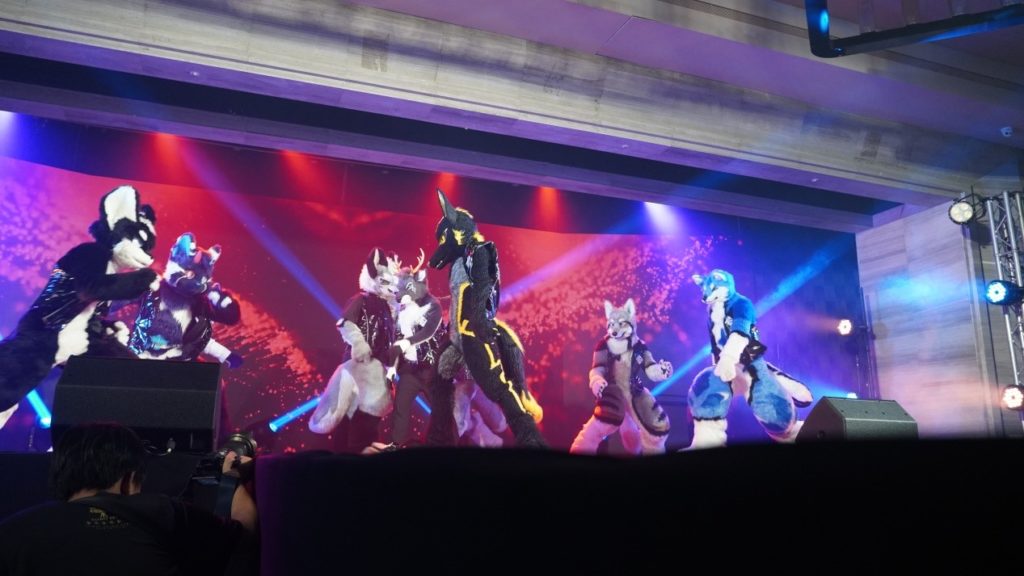 開幕表演由プロダクション体育館(上圖)和WANNABEAST(下圖)分別演出。圖/藍風攝
開幕表演由プロダクション体育館(上圖)和WANNABEAST(下圖)分別演出。圖/藍風攝
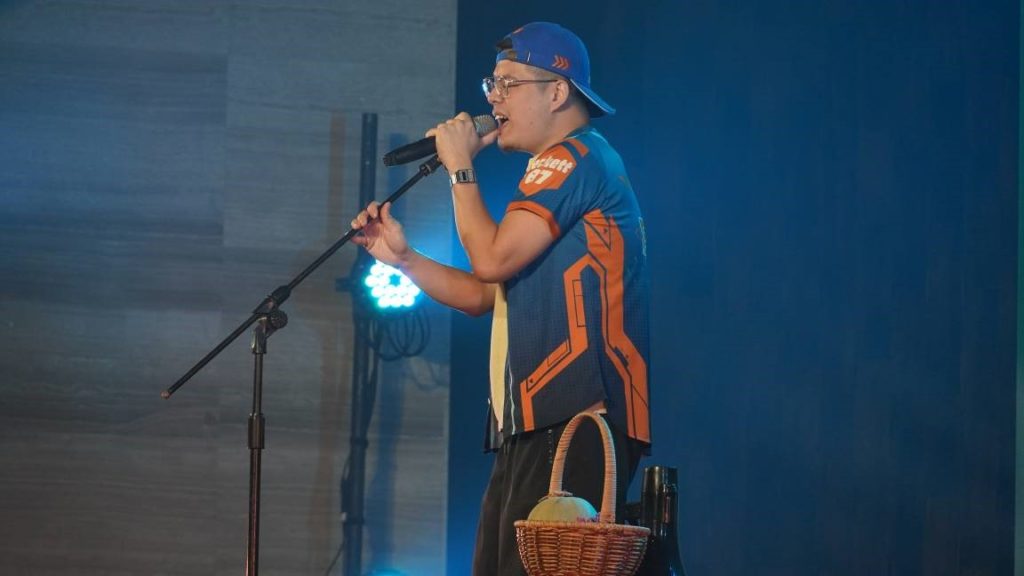
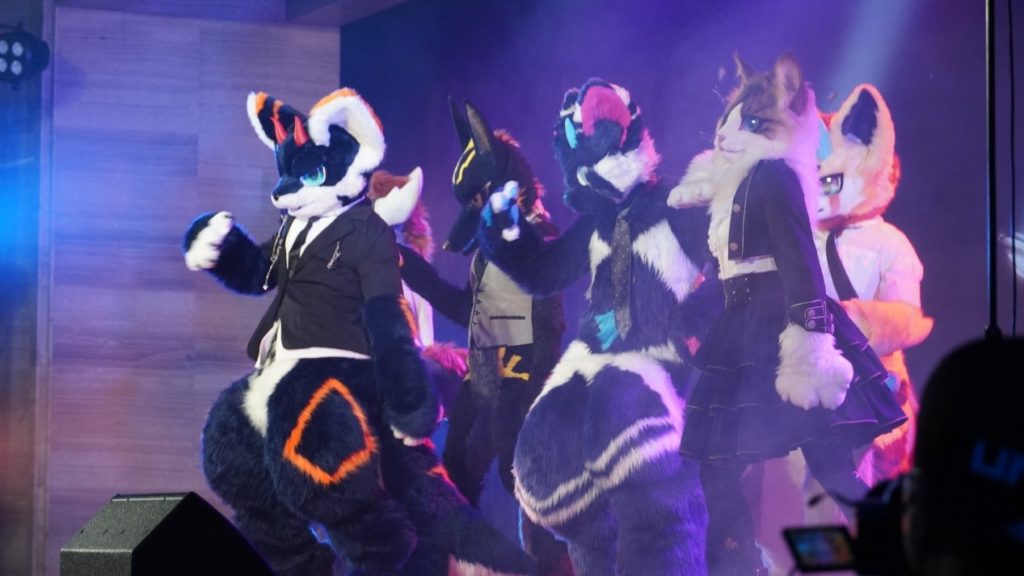 第二屆舞台大對決上,聚集眾多表演者或團隊上台展現才藝。圖/藍風攝
第二屆舞台大對決上,聚集眾多表演者或團隊上台展現才藝。圖/藍風攝
今年的FurMIT也同樣有提供場地供參加者自行舉辦Panel,今年在眾多獸迷的共襄盛舉中舉辦了26場主題各異的Panel,講題涵蓋攝影、舞蹈、法律常識普及、音樂、TRPG等多樣化題材,讓參加者可以自由前往參與。官方活動除了廣受參加者好評的氣球派對、DJ party外,本次活動的官方攝影棚更是設置多種主題供參加者選擇,除了有影展主題以及360度環景拍攝外,更有接下來10月獸無限Infurnity的主題攝影棚,吸引不少毛毛到場拍攝。
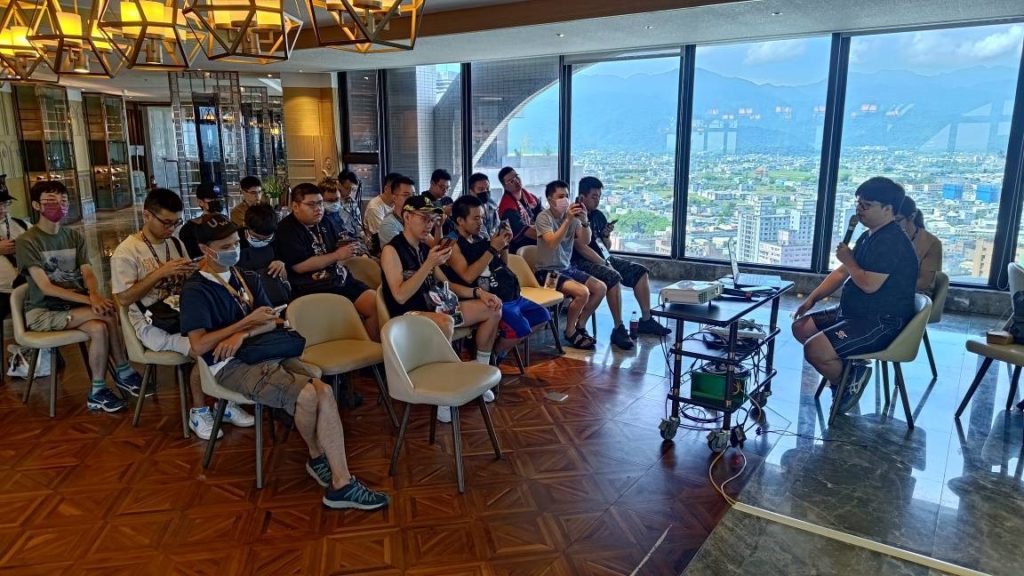 各式主題panel吸引參加者到場聆聽。圖/藍風攝
各式主題panel吸引參加者到場聆聽。圖/藍風攝
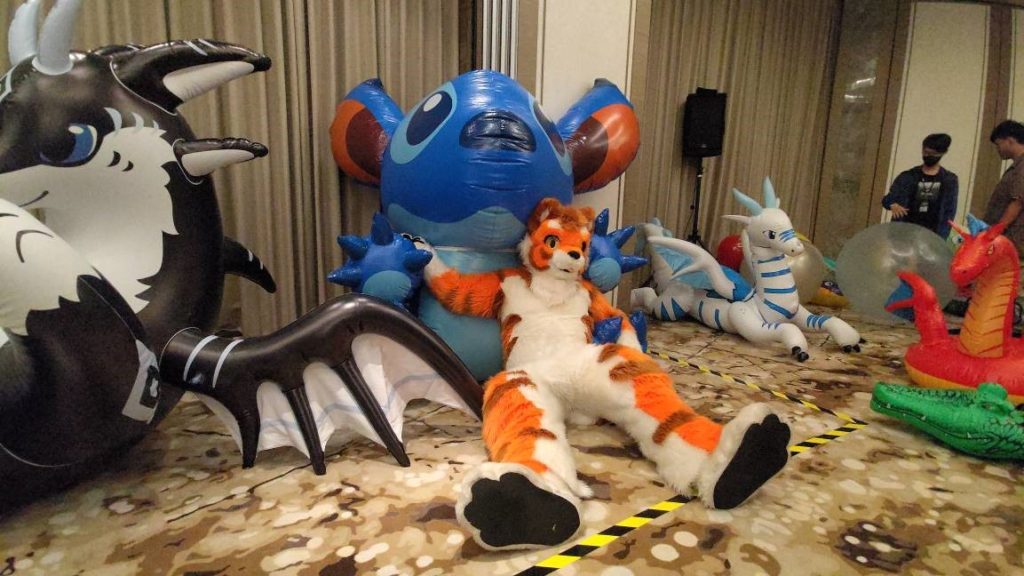 氣球派對吸引毛毛到現場合影互動。圖/藍風攝
氣球派對吸引毛毛到現場合影互動。圖/藍風攝
本次活動也準備多樣公益抽獎禮品,最終在眾多參加者的支持下,募得506950元打破去年紀錄,並將全數捐款給台灣石虎保育協會。
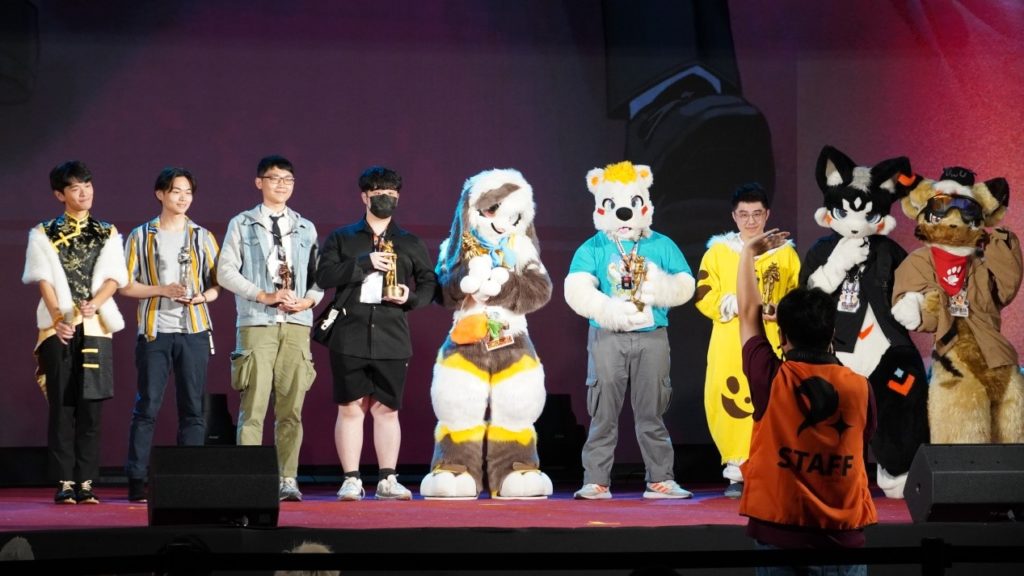 閉幕式活動上,官方對有獲選的影片進行頒獎。圖/藍風攝
閉幕式活動上,官方對有獲選的影片進行頒獎。圖/藍風攝
今年的FurMIT也在閉幕式後舉辦晚宴活動,提供獸迷們一個充滿美酒、餐點與音樂的社交場合,讓台下觀眾除了享用美食外,也可以欣賞舞台上國內外表演者的演出。
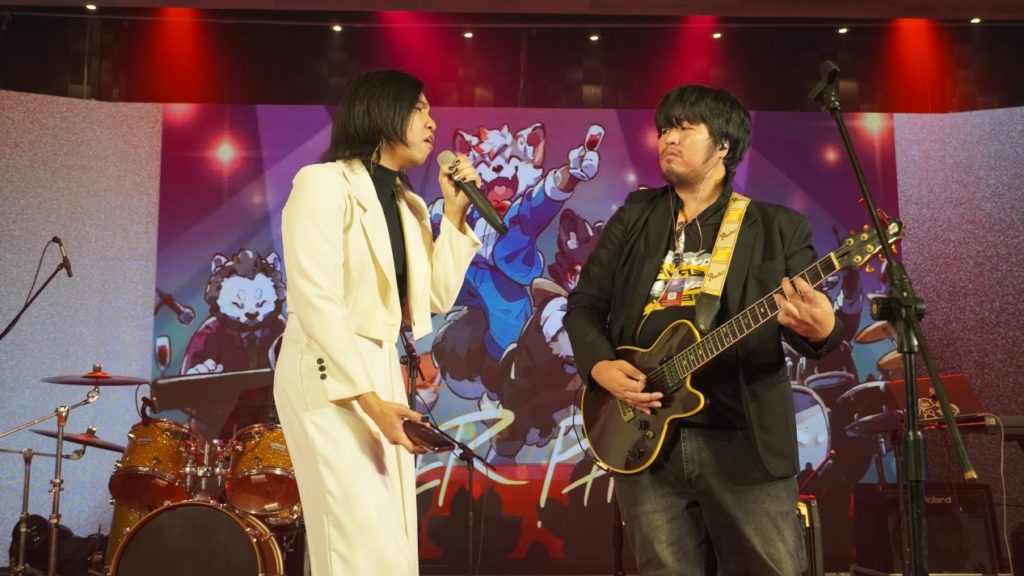
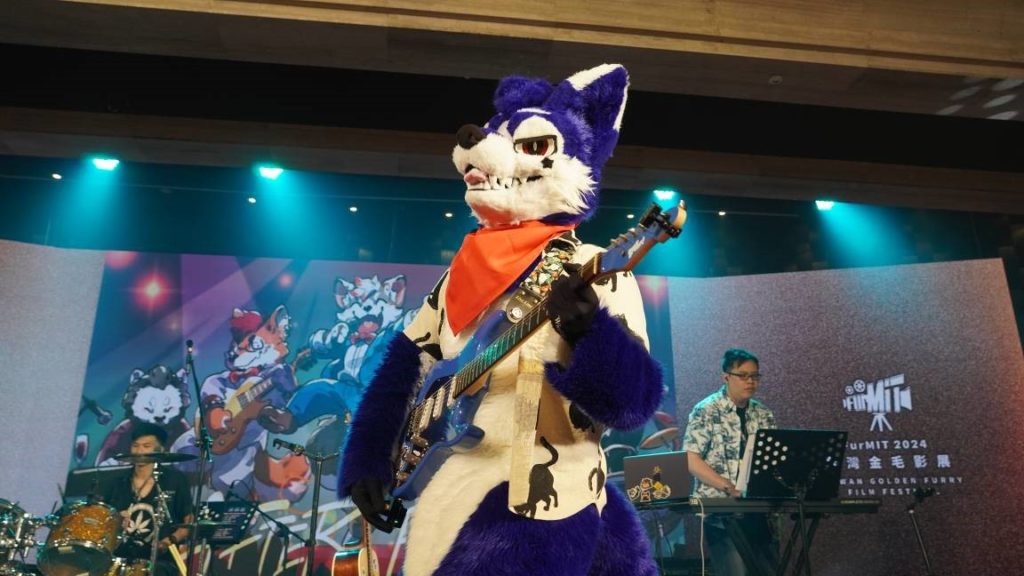
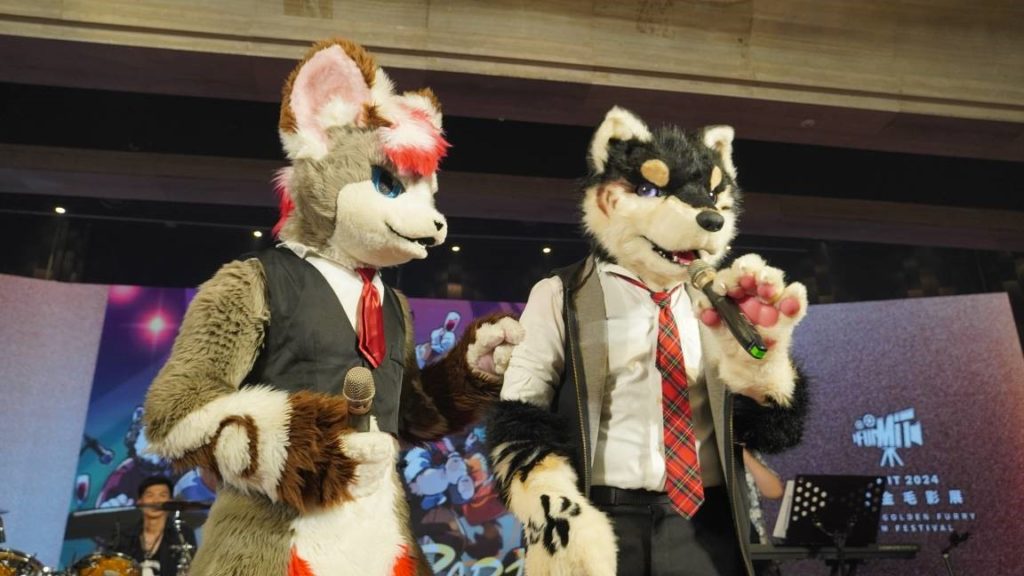 金毛晚宴有國內外唱歌好手們上台輪番演出。圖/藍風攝
金毛晚宴有國內外唱歌好手們上台輪番演出。圖/藍風攝
與過往活動時安排的展售會時段不同,今年FurMIT首次將展售會MIT MALL的時間定在第一天的晚上進行,雖然與DJ Party以及部分Panel有所重疊,但仍吸引大量獸迷前往選購商品。
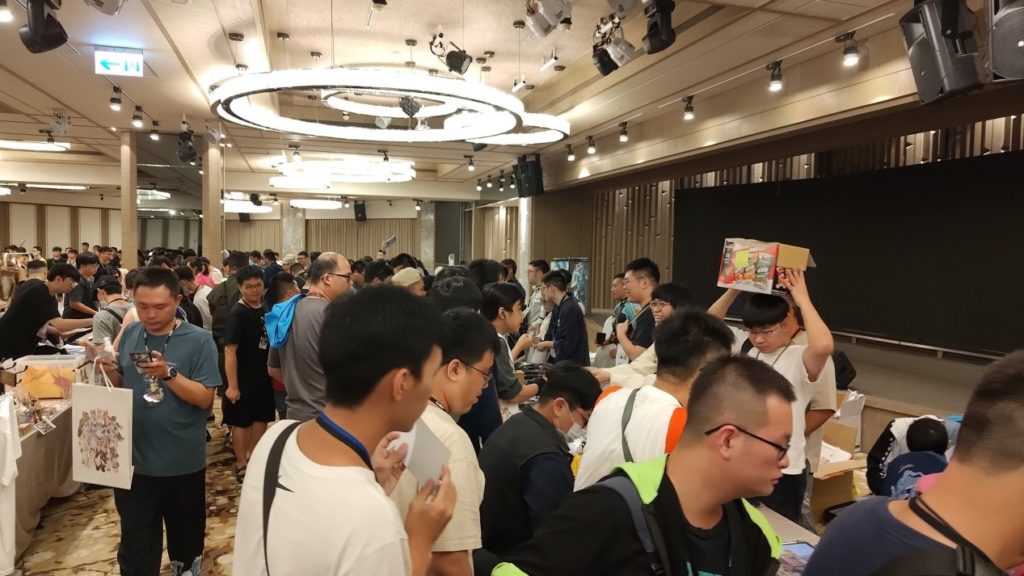
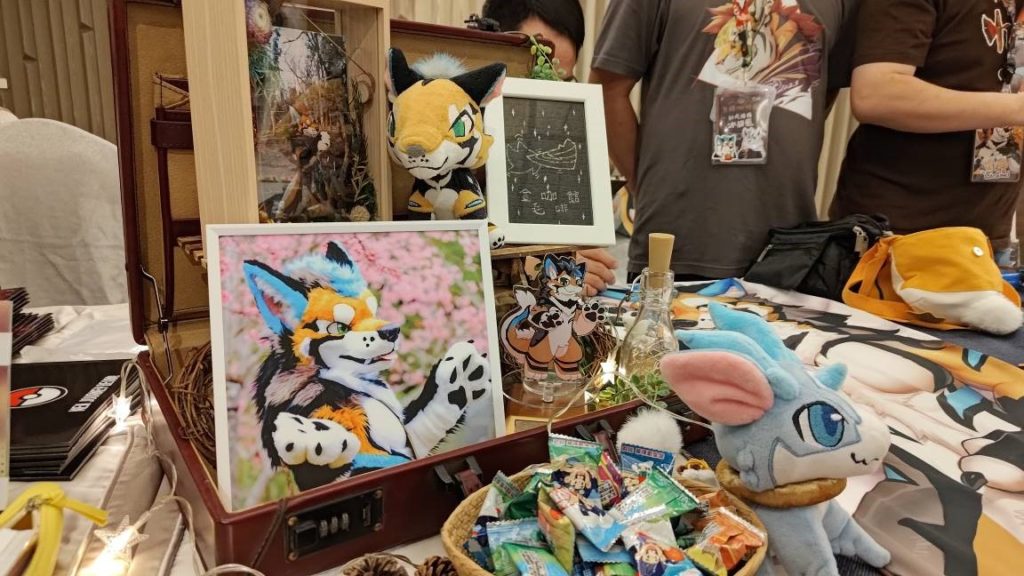 MIT MALL仍有許多參加者到現場以購買支持創作者。圖/藍風攝
MIT MALL仍有許多參加者到現場以購買支持創作者。圖/藍風攝
閉幕式活動上,主辦人框框和季雪表示,本屆活動為最後一屆,並且以影片表示未來將會有全新團隊進行新的獸聚活動-學園祭。雖然活動時間跟地點都尚未公布,但表示未來活動請各位獸迷多加支持。
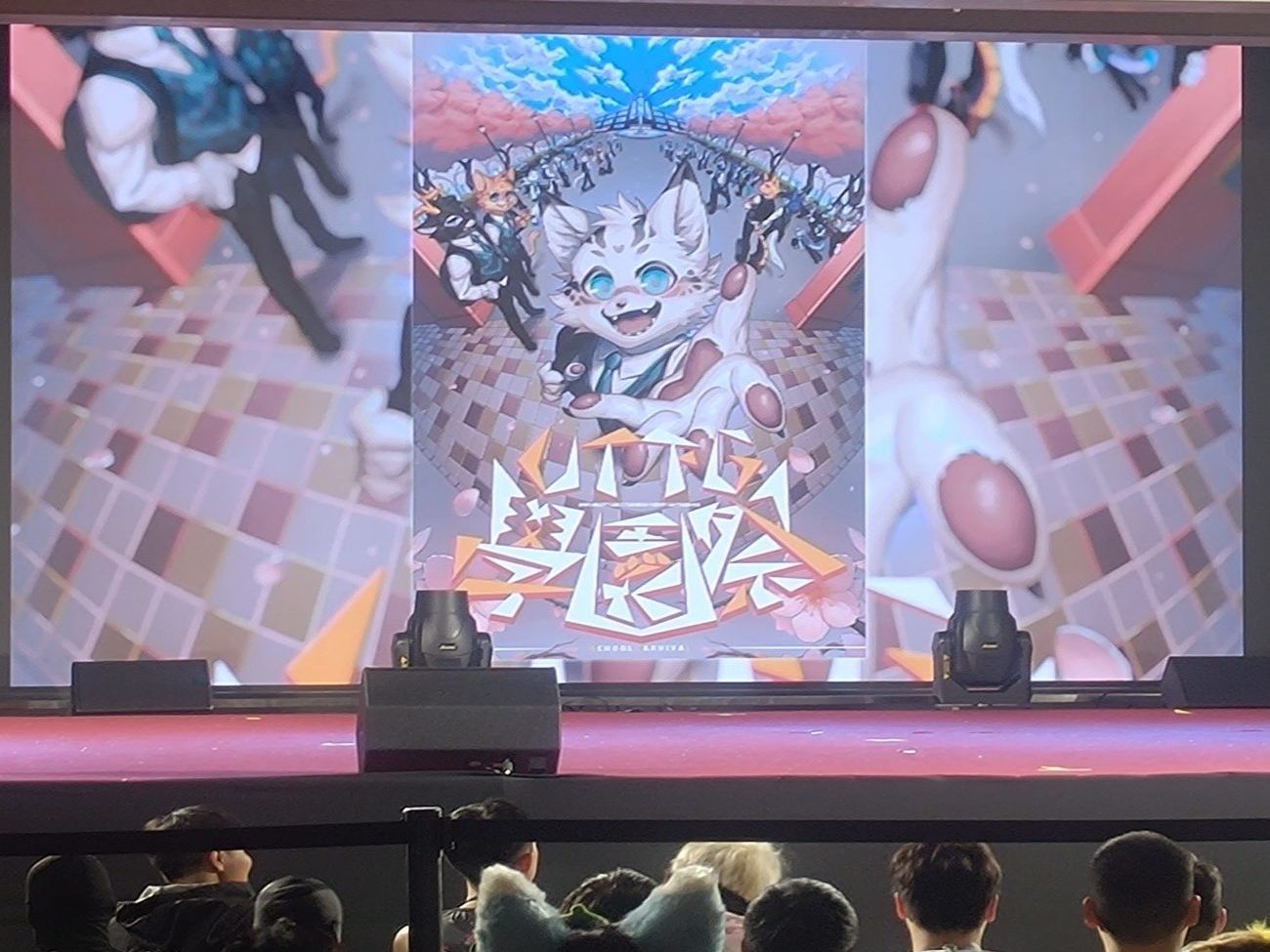 本次活動落幕後,將由全新團隊帶來新活動UTFG學園祭,時間地點尚未公布。圖/藍風攝
本次活動落幕後,將由全新團隊帶來新活動UTFG學園祭,時間地點尚未公布。圖/藍風攝
(以上報導照片經由FurMIT官方同意拍攝)
FurMIT 2024: Film and furry festivities in eastern Taiwan

FurMIT 2024: 台湾东部的毛兽主题电影庆典
Palworld Review

Wow I sure have a lot of hours on survival games, I also really like creature collecting games. Wouldn’t it be awesome if I enslaved a ton of creatures and forced them to work in the mines and fight with you to capture and enslave even more creatures could find a bunch of cool pals to hang out with while playing a survival game? Seriously though, Palworld takes the best from both survival and creature capture games, plus GUNS, you almost never get guns in creature capture games. In Palworld, you can turn your pals into guns!
Cancel the Good Furry Awards?
As some of you know, I have been running the Good Furry Awards for over five years now. The purpose of these awards was to thank the thankless in the fandom who do wonderful things both for furries and non-furries. We have had some wonderful winners in the past, including Ash Coyote, Dogbomb, Mark Merlino, and Rod O'Riley. I was particularly glad that Mark was able to receive a Lifetime Achievement Award before he passed away.
I never wanted these awards to be "popularity contests." Honestly, I value everyone who was nominated because the intention was to give everyone who makes an effort to make the fandom a better place a paws up and a fuzzy hug. That's exactly the message in our theme song that was written by the fabulous Pepper Coyote. No, the true reason I started this project was that I was so exhausted from hearing furries criticizing the fandom all the time that I wanted to counteract all the negativity with something more positive: the Good Furry Awards.
From the beginning, the GFAs have been criticized by the furry community. They have been called "fake awards," "popufur contests," and worse. Furries have tried repeatedly to stuff the voter box and to nominate fake people. At first, I brushed this off because I had the same reaction when I started the "Ask Papabear" column. I said to myself, "Buck up, Grubbs. People don't understand what you're trying to do, but they will eventually, and they'll see you are doing something good for the fandom." Things did get better for my column (although I still get snarky comments on occasion), but the same cannot be said for the GFAs.
After five years, I still feel like the community finds these awards somehow offensive. I still get criticized for them all the time (which is weird because people don't criticize the Ursa Major Awards, but whatev). I've been wracking my brain as to why. Is it because the award winners are selected by popular vote? If that were true, the People's Choice Awards would have failed long ago. Is it because it is "fake" because I do all the work and not some corporation or national organization? Therefore, it's not "legit"? Or are the GFAs merely despised because furries who don't get nominated feel they aren't getting acknowledged?
I honestly do not know the answer.
But I do know this: Even though my intentions were always good (which is how one paves the Road to Hell, am I right?), if I am putting thousands of dollars and hundreds of hours of my own money and time into a project that nobody wants, then maybe my entire concept was misguided and wrongheaded. Perhaps I should try to find another way to thank furries on my own and not worry about what the fandom as a whole thinks. After all, if YOU don't want the GFAs, then why the heck am I doing all this work? My bad.
As with the awards, though, I didn't want to make this decision without any input from furries. After all, I could be wrong. Maybe there are a lot of fans out there, and I just don't know it.
So, here's the deal: I'm putting it to a vote.
From now until August 31, you can vote on whether of not the Good Furry Award will stop now or continue on. How does this work? Well, being the good anal bear that I am, I made up fake ;) guidelines, towit:
1. There must be at least 200 votes received by the end of the month. (Weak turnout indicates apathy, and with several hundred thousand furries in the world, if I can't muster 200 votes, that's pretty telling.)
2. There must be a 2:1 ratio of Yes to No votes for the Yes column to win.
I will announce the results September 1.
GO HERE TO VOTE
Bearly Furcasting S5E4 - A Return From Vacation - or - What Are You Talking About Taebyn?
MOOBARKFLUFF! Click here to send us a comment or message about the show!
WE ARE BACK!
Taebyn, Rayne and Bearly discuss the goings on of the last MONTH! Whew…getting vacations is hard work! Bearly recounts his motorcycle vacation, Rayne tells us all about his new eyes and new job. Taebyn has been spinning the last month and he has so much to get out including lots of media, lots of games, and lots of math! So buckle in for a wild ride! We have too many puns, too many bad dad jokes, and so many twists and turns, you will think you are on a roller coaster! So come “set a spell” with us here at BFFT. You will be indifferent that you did.
This podcast contains adult language and adult topics. It is rated M for Mature. Listener discretion is advised.
Thanks to all our listeners and to our staff: Bearly Normal, Rayne Raccoon, Taebyn, Cheetaro, TickTock, and Ziggy the Meme Weasel.
You can send us a message on Telegram at BFFT Chat, or via email at: bearlyfurcasting@gmail.com
49-Year-Old Furry Is Having a Hard Time Socializing with Younger Furries
Simply put, I've been interested in the furry fandom for a couple of years but unable to speak to anyone "inside." I turn 50 this year, and that seems to be a big turn off. I tried a couple furry type chat groups and once they found out my age, they all attacked. I have a difficult time talking to young people since I'm single with no little deductions of my own. I should have lied when registering but thought better of it and forgot the websites. I registered in haste and with no intention of staying. Nobody will find me online. I have no fursona, no artistic ability, no friends and abandoned family over 30 years ago.
I'm a lone wolf, literally.
I gave up trying but can't help but watch a few furries on YouTube and attempt to attend an annual con that comes to town. Last year I missed it (the con) due to working in another hotel that weekend. I'd love someone to help create a fursona and I'd totally suit in public as much as possible. Just not now; it's literally 110 degrees every day in south Texas.
I reckon my question is: Should I just give up completely or is there some other way to make new furry friends both locally and abroad? This is all very frustrating and depressing.
Thank you for your time,
Jacob (San Antonio, age 49)
* * *
Dear Jacob,
Always nice to meet another greymuzzle. Yes, the difficulties you face relating to members of a fandom composed mostly of young people in their teens and twenties can be a challenge.
But don't give up yet!
If you're feeling lonely and unloved, I have just the groups for you. Just so happens I run the Greymuzzle group on Facebook that has over 4,000 members just waiting to say UwU and Awoo! to you! Everyone in this group is 30 and older, with many in their 40s, 50s, and up. I also formed a strictly 50 and above group called Silvermuzzles that has over 300 members. Please feel free to join these groups.
There are also some greymuzzle groups on Telegram, Discord, Amino, and, I believe, X (Twitter) that you can join. Just go to your favorite app and search on "greymuzzle" or "graymuzzle" and see what comes up. Oh, you might also try "elderfur," which is a term that is sometimes used, though not too much.
I feel the need to remind my readers (and you) that you don't have to be a fursuiter, artist, writer, gamer, or "influencer" (gods, I hate that word) to be a furry. Hell, you don't even need a fursona to be in the fandom, although it is a bit more fun if you do have one. The definition of a fandom is not "you must be able to produce stuff related to your interest" but only "you must love the thing that interests you." Being a furry simply means that you love the anthropomorphic animal arts. The fun of being in a fandom is to enjoy things like movies, TV shows, books, and comics and to share your love with like-minded people.
The problem with many in the fandom (not just furries but pretty much everywhere in the USA, at least, if not other countries, too) is that it has become a competition to be noticed, to be validated, and to stand out from the crowd. People want to be "popufurs" and be admired, followed, and lauded. This is neurotic behavior usually stemming from low self-esteem. Low self-esteem, coupled with a desire for undeserved plaudits, is a social illness in our society that is exacerbated by our bizarre virtual spectator culture. Today, the result has been a split in the fandom between furries who are genuinely into furry culture and poser furries who only do it because it is considered outlandish to wear costumes in public and act goofy. That is, they just want to do anything they can to get noticed (I once heard such a furry, when asked why he was fursuiting, reply, "Because I'm bored.") These are the furries who later "leave the fandom" because they "grow up" and aren't preoccupied with attention anymore (busy with careers and family), rather than the furries who don't care about being noticed and just adore anthros no matter what life brings them or what others think about them. They aren't in it for an audience. They're in it for love.
Getting off my soapbox. . . .
I have another suggestion or two. In addition to joining one of my Facebook groups, I recommend you experiment with going to various cons and meets. Not all of them are shaped by the same cookie cutter. You mentioned that you went to the furcon in your town. Seeing that you live in San Antonio, I'm guessing you attended Alamo City Furry Invasion. If that con didn't feel friendly enough, the good news is that in Texas you can also find Furry Fiesta and Furry Siesta (both in Dallas) and Texas Spurs & Furs in Baytown near Houston. Depending on who runs a con, some are good and some are ... well, maybe not so good. My husband and I have a favorite con in Reno called Biggest Little Fur Con that we go to every year. I'm also trying out a new con next month much closer to me called Another Furry Con (I like that they are unafraid of being lame haha) in Ontario, California. It will be interesting to see what the atmosphere is like there.
As for meets, if you are unaware, there is the River City Furbowl in San Antonio on August 25 that you could check out.
Furmeets vary in quality, too. It's all about the person (or persons) who organizes and runs it. Some are quite horrible because they are run by furries with huge egos who create cliques that are impenetrable for new people who want to join. Other furmeets are loving and welcoming because they are run by cool furries. You just have to experiment and see what works for you. But if that doesn't work either, there is yet another option: Start your own furmeet, invite the people you want to invite, and organize your own activities for the meet.
I think your first step should definitely be to join my Greymuzzle group and/or the Silvermuzzle group. You will find many many mature furries there who will gladly help you with things like finding a maker for your fursuit and offering tips for fursuit maintenance and performance. They can also help you with your fursona if you like. That's 4,200 furiends in your age group that you can have instantly by joining!
Hope this helps! Hope to see you in my group soon!
Hugs,
Papabear Grubbs
BioGun Review

Metroidvanias can be a dime a dozen in the gaming world. Similar to roguelikes, they’re a popular genre amongst indie developers. When looking at these types of games, there needs to be a creative “hook” or new spin in setting or design that grabs your attention and shows you, “Hey, this is something worth checking out!” BioGun manages to do this right at the forefront with a game completely played from inside of your best friend. You explore the many body organs as a gun-wielding vaccine injected into your dog to fight the catastrophic “dooper” virus that has duped scientists around the globe as it wreaks havoc on pets. Along the way you’ll meet up and be helped (or hunted) by a vast array of cute, cool, and corrupted characters, most of which have an anthro spin on them, if they’re not viruses or enemies plaguing your dog. All of this in pursuit of eradicating the Dooper virus once and for all.
The Age of Rats: An Age of Wonders 4 Tale
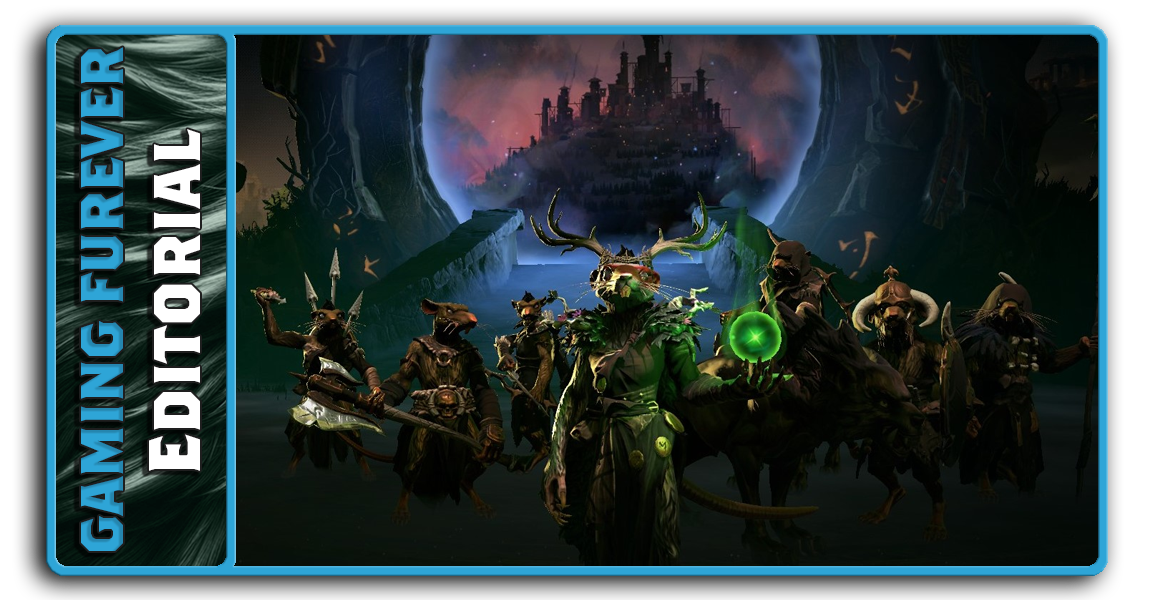
The forests of this realm were quiet, and an unsettling chill always lingered in the air. Though we channeled the Tome of Glades to camouflage our race with fur and our uncanny ability to traverse the woods gracefully, the land was hostile with an unrelenting sense of wrongness. Our magic changed barren spaces to something livable, but death wasn’t just an intangible thing here, it claimed this world and the beasts in them.